










The Famoua Through Car Line Between NewYork,Washington,VirginiaPoints,the SouthandSouthwest. PEERLESS SERVIOE. SERVIOE UNEQUALLED. 0p1,ating the Mo,t Luxuriou, and Handeomely-Appointtd Train,, compo,ed of Pullman•, Mott Modtrn and Elegant Drawing-Room Slteping Cars, and Southern Railway Dining Car,-riz. :
THB WASHINOTONANO 50UTHWB.ST81tNUMITBO-Dally between New York, Waahtngton, Virginia Points, Florida, Atlanta, Birmin gham, New Orleans, Mempbll, Chattanooga, and Na.shvtlle.
THB UNITBO8TATBS PA.ST MAll.,-Dll.lly between New York, Washington, Vlrglnla Potnts, Atlanta,._ Birmingham, New Orleana, Memphia, Chattanooga, and lfflllhvtllel Aahevtlle, £And ot the Slty ,.. Augusta, Alken, and au Florida and Oalltornla Po nts.
Students to and trom Richmond College wtll please see that thetr tickets read via southe rn RAUway.
The abort Une to Alken, Auguata, Savannah Jackaonvtlle, Na88au, N. P., JekYl 18lanc18 , operattng tbe ew York and Flortda Express dally between New York, Wflllhtngton, Vlrglnta lttee, Jaouonvllle, and au Florida Points,
THB PLOIUOA UMlTBO- A magntftcent palatial tratn..._~perated 1n Wtnter sea~onbetween New York, Waehtngton, and St. Augustine, ,..-ia.
CALIFORNIA EXCURSIONS.
Through Tourist 0&1'11operated trt -w ltly betw n Washington and Ban Franctaco, vta Atlanta, N w Orleans, and Bl Paso.
For deta.Ued lntormatton, apply to any agent southern R&Uway.
J, M. OlJLP Trafflo Manas r. (l. W. WE TB RY, T, P. A., w.A. TURib. Oen'l P eos r Asent, wublnrtoo, D. o. outbern Ran-1, 9i0

711-718 East Broad Street, VI~Glf-tIA. Ten Per Cent. Cash Discount to Students. w.s. PILOBEB , w. s. PILCHER, R. F. GA
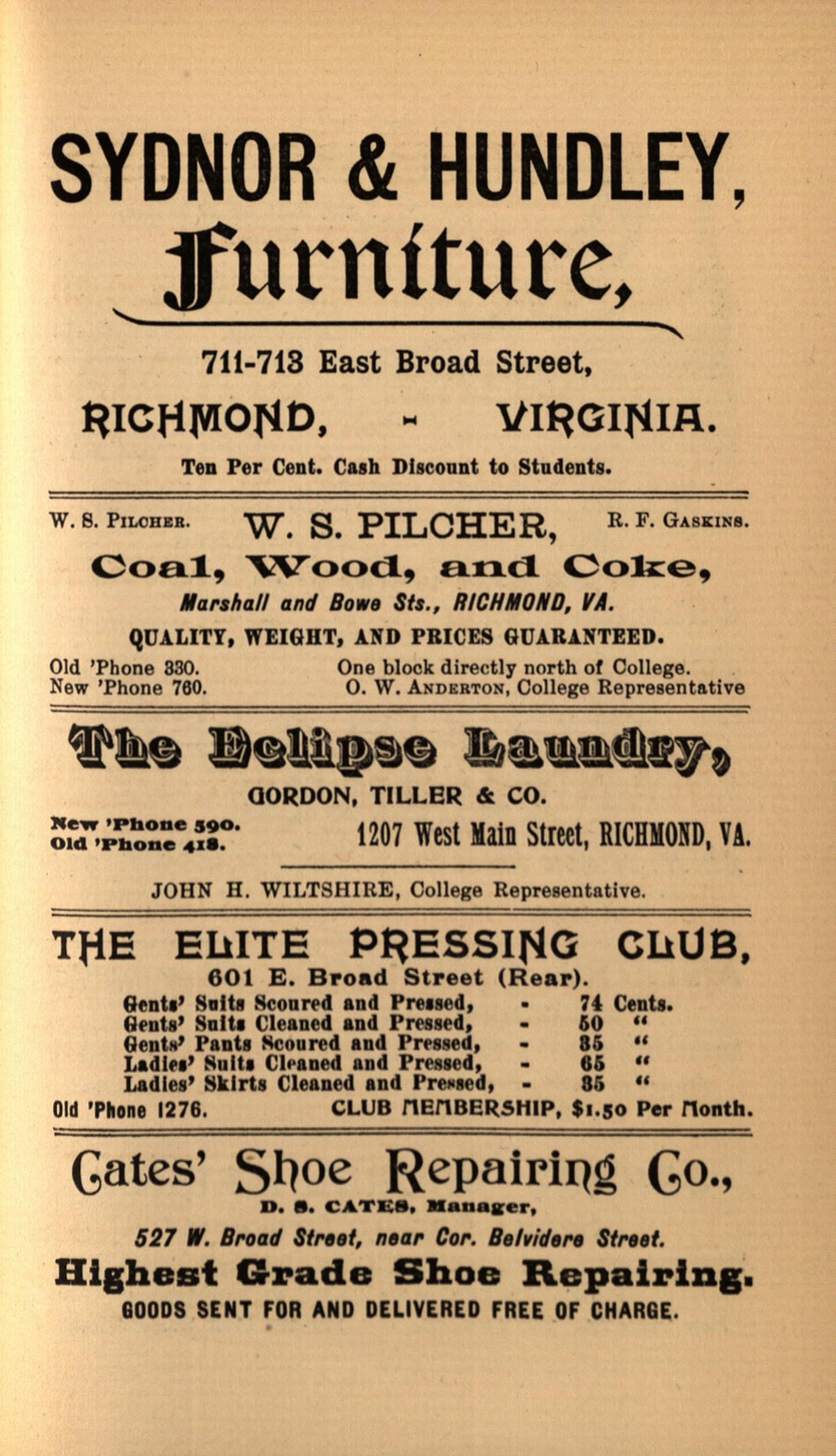
QUALITY,WEIGHT,AND PRICES GUARANTEED.
Old 'Phone 880. One blook dir ectly north of Oollege. New 'Phon e 760, 0 . W. Azro &BT ON, Oollege R e pres e ntative OORDON,TILLER & CO.
JOBN H. WILT SHIRE, Ooll ege Re pr ese ntativ e
Tl'{B BhITB P~ESSif-tG Cl.kUB, 601 E. Bl'oad Street (Rear).
Qentl' Salta Scoured and Preued, 7' Cents. Qenta' Snit• Cleaned and Pressed, 60 "
Qent8' Pants Mcoured and Pressed, • 85 "
Ladlu' Sutt, 01Paaed and Pressed, 66 n
Ladles' Skirts Cleaned and Preiised, • 86 " Old'Phone 1278. CLUB MEMBER.SHIP, $1.50 Per Month. (;ates' Slloe Repairiqg (;o., o. •• CATEe, ••a•aer, 521 W. Broad Street, near Cor. Belvidere Street. ' Bl1haat Grade Shoe Repairing. GOODSSENT FORAND DELIVEREDFREEOF CHARGE.

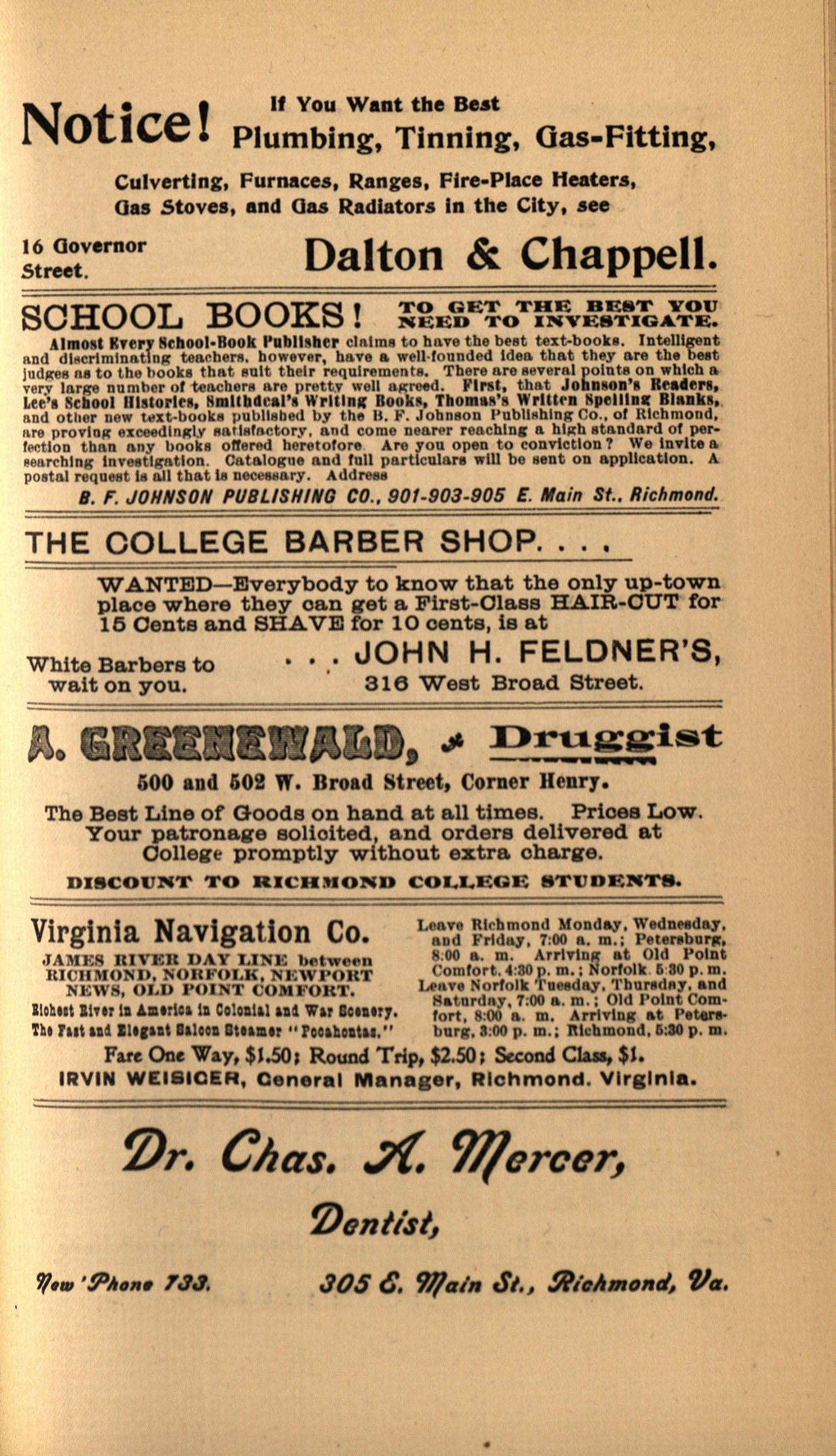
If You Want the Beat Plumbing, Tinning, Oas-Fitting,
Culvertlng, Furnaces, Ranges, Fire-Place Heaters, Oas .Stoves, and Ou ~adlators In the City, see 16 Oovernor Street.
TO GET TH£ D'E8T YOU NEED TO INVE8TIGA.TE.
AImo t Bury 8cllool•Book Publisher clnlma to hnve the beat text-boot,. Intelligent nnd dl crtmlnatlog tenchert1, however, have a well-founded Iden that they are tbe oeet Judge8 na to the booka that suit their requlrementa. There nro several polo ta on which a. ver,v large numbor or 'teMhers are prett.v well ogroed. First, that Jollnson•1 Realler1, Lee••School Ulalorlea, 8mltbdc11•1 Wrltln,r Books, Thoma&'&WrUtt'B 8pe1Unc Bianka, a nd other new wzt-booke published by the B. F. Joboaon Publlehlug Co , of Richmond, nre proving exceedlngt.v 11arlsfactory , nod come nearer renchlnc n hhtb standard of perlectlon than e.ny books offered heretofore A.re yon open to conviction? We Invite a sear ching lnv88tlgatlon O&talogue nod full partlcnlare wlll bo sent on application. A. postnl requeat Is all tbat la DOCl!88&ry.
Addre8ll
8. F. JOHNSON PUBLISHING CO., 901-903-905 £. Main St .• Richmond.
WANTED-Everybody to know that the only up-town pla.oe where they oa.n get a. First-Ola.es HAIR-OUT for 16 Oents and SHAVE for 10 oents, is at White Barbers to wait on you.
. JOHN H. FELDNER'S, 816 West Broad Street.
~-Wl-~'lliil:~~~~~4~~ • www•-
600 and 609 W. Broad Street, Corner Henry.
The Best Line of Goods on hand at all times. Prioea Low. Your pa.trona.ae solicited, and orders delivered at College promptly without extra oha.rae.
Dl9C011NT TO RICHMOND COL.C.EGE 8T11DENT8,
Virginia Navigation Co. Leave Richmond Monday, Wedneeda:,, and Frida:,, 7:00 a. m.; Peterebul'fr, JAMES DIVER DA LINE botw en ,00 & m. Arrlvln~ at Old Point RIOBMO D, "OJlFOLK,NEWPORT omlort , 4:30p m,;Norlollt 15-80pm, JSEW , OLD POI T OM ORT, Le,ive orlolk Tueeda,y, 'l'hnrad11:,, and II b I I ,. o I Haturd~Y', 7:00 a. m.; Old Point Como HI llnr I Amtr01... o 01111114WarBot1tr7, rort , :00 a . m. Arriving at PettreTbt ru1 "' llt111I latooo au111er"foo1ho1\11." burg, a :00 p. m.; lUcbmond, 6:80p. m.
Fart Oct Way, $J.S01Round Trip, $2,501S«ond Cla.u,$J. IRVIN WEISICER, Ceneral Manager, Richmond. Virginia,
I w ; FEEL THAT-;; HAVE A :, SPEGIAL
in the PRO FESS ORS an d STUDENTS of Richmon d College . We feel it our duty, as LEA D E RS I N OUT F ITTI N G, to supply them with the most eer vicen.bl e and beet in wearing app a rel, at L OWE R P RIC E S than obtainable elsewhere . We' ve suit ed t his feeling to the action, a n d offer you y our Fall a.n.d 'Winter Ou.t:flt, from head to foot, at l ower figur es than were ever quoted you, a nd all ow y ou T EN PER CENT. D ISC OUNT off th ose pri ces. We shall expect yo u all i n.

Being

Vot. XXVI. MARCH, 1900. No. 6.
BY CHARLES L. OOOKE.
I am requested to write reminiscences of my earlier days, and more especially of that period when I was a pupil at the Virginia Baptist Seminary, now Richmond College. I comply with this request reluctantly, and for two reasons: 1st. I have, through life, been a very busy body-first I was a bnsy boy, aod when I became a man this ea.dy habit was intensified. Now that I am old I am still busy, and have to restrain myself lest by over-exertion I fall into sudden collapse. I have never had time to look back. Often have I quoted the injunction, u Remember Lot's wife."
In the second place, this looking back is not only the weakness, but the great curse, of Virginians. Some say far more glorious would have been her history had her first beginning been less prominent and successful. Because such characters as Washington, J e:fferson, and many others were reared on her soil, subsequent generations have acted upon the principle of a certain rich man, who said, " Soul, thou hast much goodslaid up for many years; take thine ease, eat, drink, and be merry."
While we have been looking back, and are still looking back, glorying in the glorious past, we have failed to meet the issues of passing yea.rs, and are not now prepared for those, still more stupendous and exacting, which loom up before us. In the domain of statesmanship and political
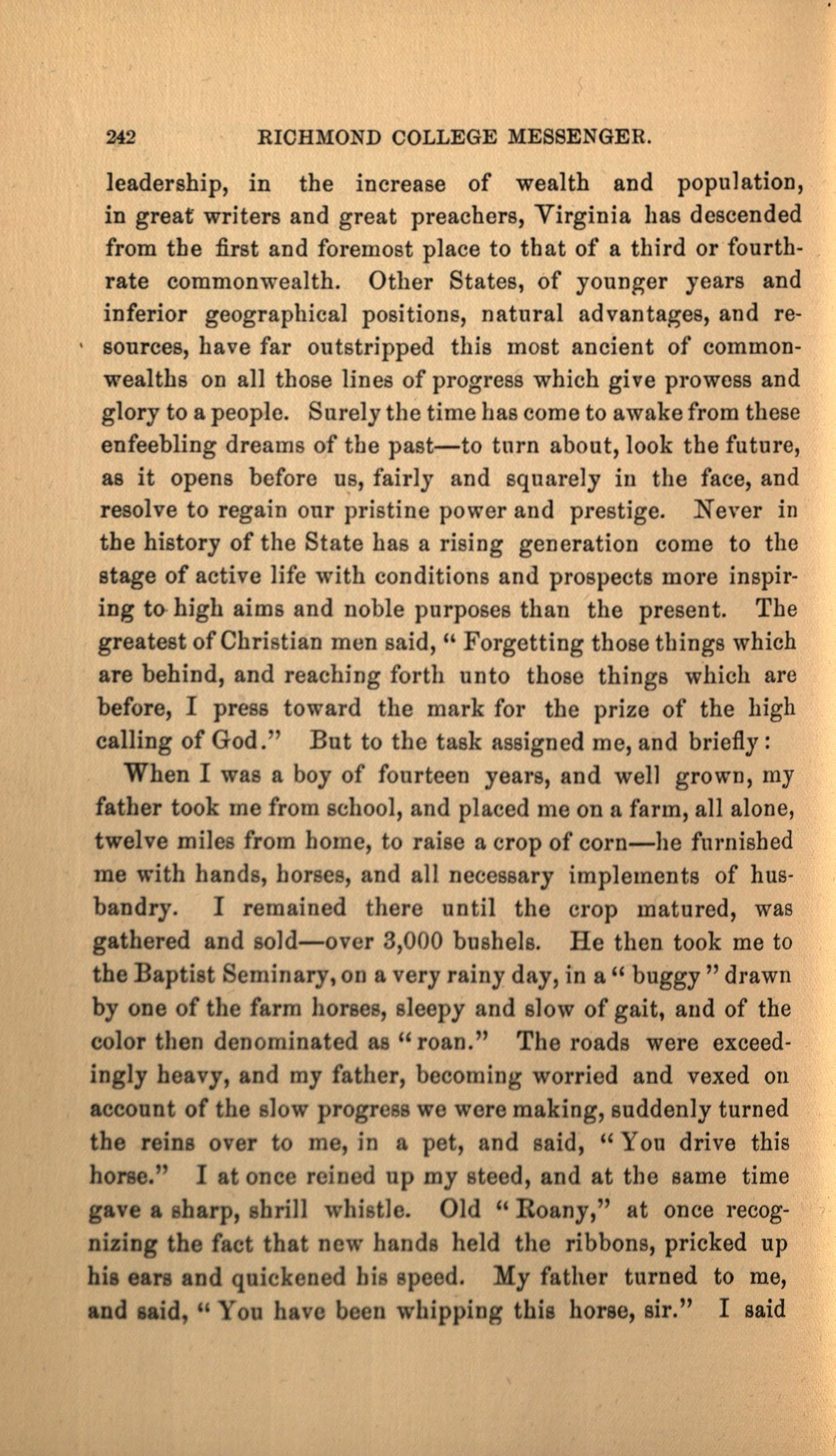
RICHMOND COLLEGE MESSENGER.
leadership, in the increase of wealth and population, in great writers and great preachers, Virginia has descended from the first and foremost place to that of a third or fourthrate commonwealth. Other States, of younger years and inferior geographical positions, natural advantages, and re. sources, have far outstripped this most ancient of commonwealths on all those lines of progress which give prowess and glory to a people. Surely the time bas come to awake from these enfeebling dream s of the past-to turn about, look the future, as it opens before u s, fairly and squarely in the face, and resolve to regain our pri stine power and p1·estige. ever in the history of the State has a ri sing generation come to the stage of active life with conditions and prospects mo1·einspiring to high aims and noble purposes than the present. The greatest of Chri stian men said, " Forgetting those things which are behind, and reaching forth unto those things which are before, I press toward the mark for the prize of the high calling of God." But to the task assigned me, and briefly: When I was a boy of fourteen years, and well grown, my father took me from s<:11001,and placed me on a farm, all alone, twelve mile s from home, to raise a crop of corn-he furnished me with hands, horses, and all necessary implements of husbandry. I remained there until the crop matured, was gathered and sold-over 3,000 bushels. He then took me to the Baptist eminary,oo a very rainy day, in a" buggy" drawn by one of the farm horses, sleepy and s]ow of gait, and of the color then denominated as" roan." The roads were exceedingly heavy, and my father, becoming worried and vexed on account of the slow progress we were making, suddenly turned the reins over to me, in a pet, and said, "You drive this horse." I at once reined up my steed, and at the same time gave a sharp, shrill whistle. Old "Roany," at once recognizing the fact that new hands held the ribbons, pricked up his ears and quickened hi speed. :My father turned to me, and said," You have been whipping this horse, sir ." I said
•' '

INOIDENTS IN EARLY LIFE. 243
"No , sir; I have not whipped the horse ." T here is a way of getting much out of horses, and men too, without abus i ng them. From that day to this I have been driv ing horses in ' J elm style, and getting much out of animals of the higher species, slow of motion and not seeing afar off; while I have done very little whipping. After a journey of twenty miles, we reached the Seminary in the afternoon, wet, wearied, and h ungry. I was in no condition to be a fair specimen of " a country boy come to town," for I was in a bad plight every way. I wore a home-made straw hat, with broad brim . Tbe rain aud mud on the tedious drive had marred my looks , my clothes, and especially my hat, which had flopped. I present ed, no doubt, a ludicrous appearance, and the boys langhed at me. George W. Royst e r, of ew Kent county, was conspicuons for smiling at the new arrival as be passed about . But before the close of that session I was the chief cocke of all those walks. I excelled all the boys in running and playing bandy-a favorite game in those days, now called " shinny." This gave me prestige in the school. But this was not aJl, for after the opening of the next sossion, secretly and to my utter surprise, I was elected . to the high position of "fir st monitor." The use of this term" monitor" must needs have some explanatfon.
Now, at that early day the institution had two features which in the lapse of years have dropped out, or been forced out by the increasing pres s ure of other and higher demands . The first of these was the absence of servants; students were required to keep their private rooms in order-no servants ent ered the se rooms save once daily, and then to fill our lamps wit h an inferior grade of oil. "Sweeping up" the rooms and "m aking up" the beds, taken by turns, by the four occnpants in each, and the bringing of the coal from the coal-house and water from the well, together with other menial service, was done by the students themselves. Our rooms were provided with open grates or coal stoves; our fuel was Chesterfiel d

244 RICHMOND COLLEGE MESSENGER.
coal," the rnn of the mine." Snch times as we had with coal smoke, coal dust, as well as every other dost, and especially kindling the fires at early dawn on cold mornings, are simply "awfnl," as the ladies say, to contemplate from the standpoint of modern inventions, comfort, and cleanliness. The Seminary suffered much in reputation, and was made the subject of ridicule by many, even some Baptists, because of its rough, illmannered home-life, and its homely, sparse, and illy-served and badly-cooked fare. Right here has been the great mistake of onr people, in educational work, for two generationswe first awaken high expectations by loud talk and big promises, and then, when intelligent people come to enter their boys, or their girls, to school, they find the loud talk, the fulsome prai se, the high-sounding resolutions were all humbug, and made for bnncombe-and this, too, mainly by the preachers; hence disappointment, revulsion, and often disaster follow.
The second feature of the school, long ago obliterated, was a manual labor department. All students were required to work on the grounds, or in the shops, for some time each day, save Sundays. The superintendent of all this was called "first monitor," and the'' second monitor" took note of the time each one worked and gav e him credit for the same, for all shared in the proceeds of their labors. Both officers were elected by the students, and now, acting as" first monitor," I found great indifference on the part of many (especially the preacher ) to such Jabors-they had to go to town, or they were feeble in health, or some other feeble, and often false, excuse wa framed to avoid physical toil.
A short time before I entered the Seminary it had been removed from the farm, four miles from Richmond, to its present location. Thi location had long been a home of wealth, culture, and refinement. Tbore was on it a well-constructed, and, for that day, n bcautifn1, family residence, fronting on Lombardy street. The yard in front, and extending to

Broad street, was ornamented with beautiful shrubbery and many shade trees. In the rear was a large flower garden, with firm white graveled walks; a large "hot house" for tender plants in frosty weather, numerous flower-beds, rose-boshes, vines, and rare trees, for both fruit and ornament. I really thought this the most beautiful place my country-trained eyes had ever rested upon. There ,vere other lots adjoining, for vegetables, grains, and grasses. All these were cultivated by the students, and after a very "poor fashion."
As the" :first monitor," I felt responsibility, and devoted my personal toils to the yard and flower gardens. I la.bored intensely, and beyond the honrs allotted to such work, for I not only realized responsibility, but I was ambitious for approval and praise. Dr. J etor, then the rising tower among t he Baptist brotherhood, and pastor of the First Church, rode op ono day on a high -headed sorrel horse to the fence on Broad street, and, looking over into the garden, remarked," I have never seen these gronnds in such fine order." This was unexpected praise and stimulated me to greater efforts.
I could relate many amusing and instructive incidents in my experience while connected with the institution, both as a student and afterwards as an officer, but this hurried sketch is already too long. I must say, however, that my residence on the Pamankey farm, in King William, and my training at t~at school, with all its hardships, its discomforts, its inadequate facilities, its inferior standards as to both instruction and social manners and bearing, laid the foundation of my meagre success in a long life. I was educated for a farmer, and all my near relations, as well as myself, looked forward to nothing beyond. The change of plan and purpose was sudden, and was brought about as follows:
The late Dr. E. L. Magoon came to Richmond to supply the pulpit of the Second .Baptist Church, the regular pastor, Rev. J. B. Taylor, deceased, having been appointed chaplain to the University of Virginia for the period of two years,
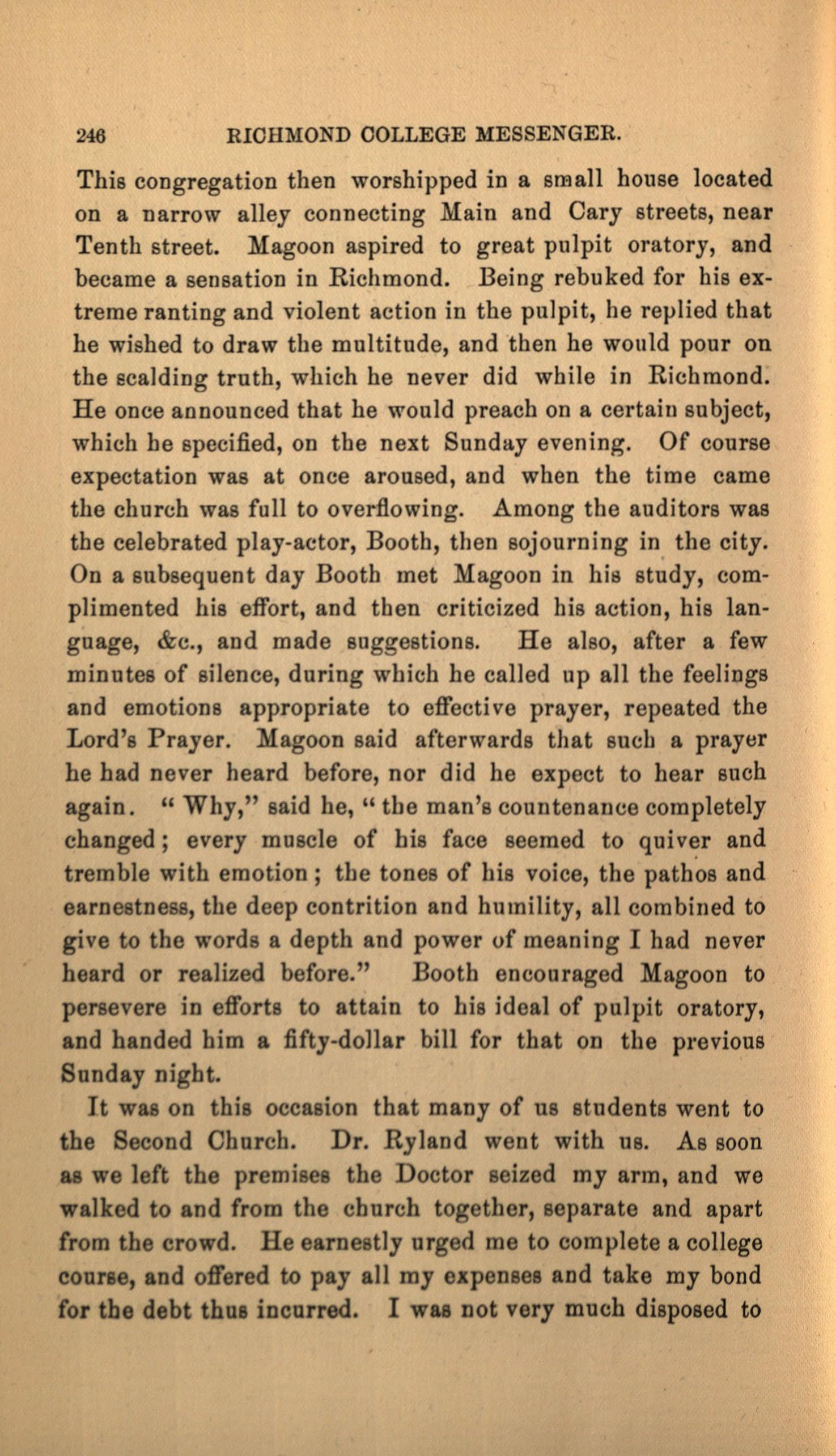
RIOHMOND COLLEGE MESSENGER.
This congregation then worshipped in a small house located on a narrow alley connecting Main and Cary streets, near Tenth street. Magoon aspired to great pulpit oratory, and became a sensation in Richmond. Being rebuked for his extreme ranting and violent action in the pulpit, he replied that he wished to draw the multitude, and then he would pour on the scalding truth, which he never did while in Richmond. He once announced that he would preach on a certain subject, which he specified, on the next Sunday evening. Of course expectation was at once aroused, and when the time came the church was fall to overflowing. Among the auditors was the celebrated play-actor, Booth, then sojourning in the city. On a subsequent day Booth met Magoon in his study, complimented his effort, and then criticized his action, his language, &c., and made suggestions. He also, after a few minutes of silence, during which he cal1ed up all the feelings and emotions appropriate to effective prayer, repeated the Lord's Prayer. Magoon said afterwards that such a prayer he had never heard before, nor did he expect to hear such again. "Why," said he," the man's countenance completely changed; every muscle of bis face seemed to quiver and tremble with emotion; the tones of his voice, the pathos and earnestness, the deep contrition and humility, all combined to give to the words a depth and power of meaning I had never heard or realized before." Booth encouraged Magoon to persevere in efforts to attain to his ideal of pulpit oratory, and handed him a :fifty-doJlar bill for that on the previous Sonday night.
Jt was on this occasion that many of us students went to the Second Chnrch. Dr. Ryland went with us. As soon as we left the premises the Doctor seized my arm, and we walked to and from the church together, separate and apart from the crowd. He earnestly urged me to complete a college course, and offered to pay all my expenses and take my bond for the debt thus incurred. I was not very much disposed to
BRUTUS AS PORTRAYED BY SHAKESPEARE. 2(7 do this, but he was persistent, and I finally consented. All this was carried out, but my father vory soon cancelled those bonds. I went to Columbia College, Washington, D. C., and graduated in two years. He then bad me called back to fill the position of first tutor in the Seminary. Thus a farmer boy was transformed into a country school manager.
Doring my connection with the Seminary, both as student and officer, a large proportion of the students were candidates for the ministry. This class of students were not boys, but men, all over twenty-one years of age, and some reacping up to thirty-fl.ve. In no respect have the Baptists of Virginia made more radical changes than in what is termed "a call to the ministry." In my early days no one became a candidate for ordination until he became a man of fixed habits and exemplary life, accompanied with gifts and qualifications for that high calling. But how is it now 1 nd what does the marked innovation portend 1
With tho meagre facilities placed in the hands of Robert Ryland, considering the rough-hewn material be bad to work upon, he accomplished a marve1lous work. From such beginnings, in less tban twenty years, he changed the whole phase of the Baptist ministry of the State. His men were everywhere-in the mission fields, in the country pastorates, in the city pulpits, in the educational work, in the foreign .fields,in the editorial chair; and everywhere they bore with them the impress of tha.t wise and noble man of God. Hollins, Va.
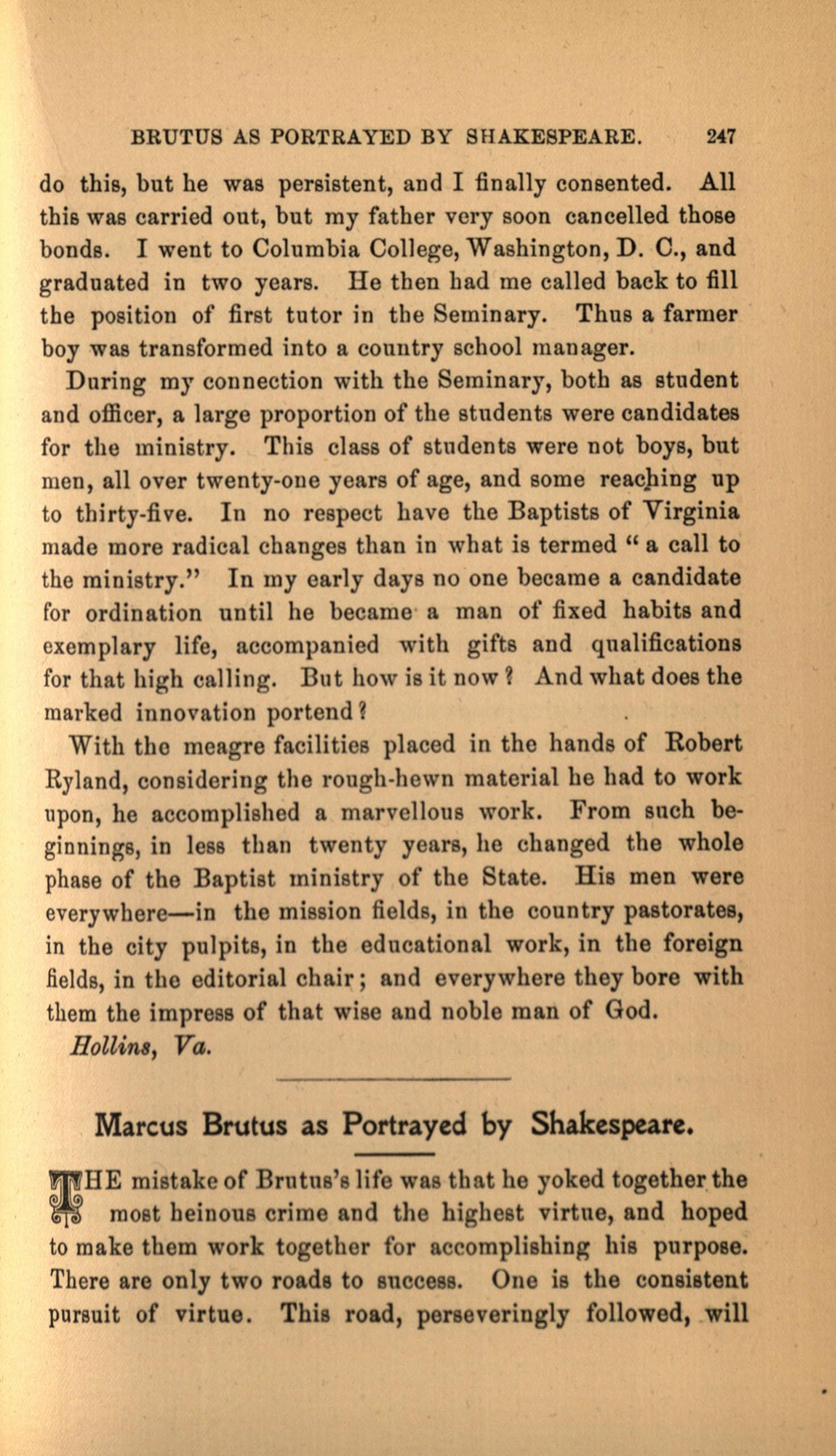
N!!HE mistake of Br11tns's life was that he yoked together the most heinous crime and tho highest virtue, and hoped to make them work together for accomplishing his purpose. There are only two roads to success. One is the consistent pursuit of virtue. This road, perseveringly followed, will

lead us to the best success in both worlds-the one this mortal vision sweeps and the one revealed to fahh alone. The second road to success is the cultivation of such a conscience as, having permitted us to commit the :first crime, will not scruple at any number of crimes that the first may have rendered necessary. This road will not lead us to the best success, but it will sometimes help a man to · achievements conspicuous and dazzling, though they must always be unsatisfying and transitory. So Richard III. became King of England; and such has been the career of all who have " waded through slaughter to a throne." But Brutus took neither of these roads. He did not take the road of a consistent pursuit of virtue; because he allowed himself to be seduced into the bloody deed of assassinating Cmsar. He did not take the road of committing whatever other crimes bis first crime made . necessary; because, having assassinated Cresar, be recoiled from the suggestion to put Mark Antony also to death; because, having assassinated Cresar, be could not be so severe as to deny to Mark Antony the privilege of speaking at Cresar's funeral; because, having committed murder, be is horrified at the idea. of giving or taking bribes. Thus Brutus loet the recompense both of consistent virtue and of consistent wickedness: and so "all the voyage of bis life is bound in shallows, and in miseries." What, then, is the philosophy of Bmtus's career f
1. The ends that can be secured by the unwavering and consistent practice of virtue are the only ones worthy of responsible and immortal beings.
2. When we wish our chariot to move forward, let us not venture to harness to it a team made up of virtue and crime. They cannot be made to pull or work in concert. "Thou shalt not plow with an ox and an ass together." "What fellowship hath righteousness with unrighteousness i And what communion bath light with darkness i"
8. Let us, in seeking any end we desire, shun the :first resort
249 to wrong; because often the first will not avail unless we are prepared for the second, nor will the second unless we are prepared for the third, and so on to the end.
4. Though some sort, and some degree, of success may follow consistent and unscrupulous crime, yet the attainment wiJl be found far below the price paid. When the crown of success has been thus obtained, the jewels upon it will be smeared and dimmed by the filth and blood through which we have waded in the pursuit; and presently crown and jewels will alike fall away, while filth and blood will stain our souls forever. JoHN
POLLARD.

Crozer Letter.
IT is with r~al pleasure that I write THE MESSENGERto-day t the ' 1 Orozer Letter" asked for. I should like to begin by saying: "Hurrah for the Ohristmas issue of TnE MESSENGER I" I should want only one better advertisement here for my alma mater than to have such copies as this to come to our reading-room. The one better advertisement would be for her representatives he1·e to maintain a high record, in the class-room. To do this for her sake, you may be sure, is in every Richmond Oollege man here a strong incentive to success, and I do not put it immodestly when I say that the representation of Rfobmond Oollege men here is good. Professors have commented on the good work done by our men, especially in Greek. Yet I would have you bear in mind that there are exceptions, and that one cannot honor his college if he comes here with imperfect preparation.
But I want to tell you especially what Orozer is. My purpose will be to help men decide what is the best seminary for them to attend. lf that be Louisville, my Southern spirit will rejoice in the fact. And so I shall not flatter Orozer. I wish you to know her accurately.
First, I wish to say that, except by recent students, Orozer

RICHMOND COLLEGE MESSENGER.
has been-not misrepresented, but represented as she was years ago. By no means is it true to-day that one can graduate here without hard work. It was true in a measure only a few years ago. Bot it most be remembered that Crozer is only about thirty years old, and that a standard is a thing of growth. Within even the past ten years its standard has been raised greatly, and is yet rising year by year. And so to-day whoever de sires an easy course at the seminary must go elsewhere. In fact, the man that does not make his classes at Richmond College can hardly hope to graduate here. True, he may stand a fair chance to make the English course, which is provided for men without college training. For my own part, I have found it necessary to work harder, perhaps, than I ever had to work at Richmond College. After some inquiry as to the amount of work done by other seminaries, I feel warranted in saying that very few do as much work as Crozer.
An important point in favor of Crozer is its classification or gradation of course s. Rochester and various Northern seminaries have only one regular course, which all must take, and which is open only to college graduates. Orozer, besides offering an English coarse to all, provides two courses for college graduates or the eq n.ivalent. It is not generally observed that our plan makes it possible to maintain a higher standard than could be secured by admitting only college graduate s to a single course. For some college-bred men, as a matter of course, will not succeed in the study of Hebrew and Greek, and, if forced to take it, will cripple the work of the class. In Crozer each man must take the course for which he is individually qualified, and his continuation in any course is made conditional on his doing good work in that course. It actna1ly happens that men who are college graduates are not allowed to take the Greek course. For such men, however, in struction in Greek is provided.
The faculty of Crozer is unquestionably strong; it is strong in every department. Not only so, bnt several have positions

LETTER. 261 of eminence. Our aged president has been classed as one of a great trio of educators of the past generation-Hopkins, Broadus, Weston. One has declined the presidency of a leading Northern seminary, while two others are generally acknowledged as being among the highest authorities in their departments of knowledge.
0rozer is not very generally known, because it does not advertise nor canvass for students. As it is, from twenty-five to fifty students · are turned away every year, for lack of accommodation . There is reason to hope for enlarged capacity ere long. Within a few years nearly a million dollars will accede to the endowment; and there is at least a speculation that by further bequest from the Crozer family this will become one of the richest seminaries in the world.
I wish I could tell you something about the natu1·e of our work. It is fascinating to study Church History by our method-chiefly by consulting original documents and general literature. On the whole, the seminary course seems more pleasant and satisfactory than the college course-not easier, however. As to preparation for the course here, I should say the most helpful work would be in History, Greek, and Philosophy. The college, too, should provide a short course in Hebrew, by all means.
As to the importance of a seminary course, my short stay here has been a 1·evelation. Hitherto I had considered it as only useful and helpful. Now I should say, emphatically: Let no man presume to settle down in the ministerial work withouthaving taken a course at the seminary.
Assuming, as I believe is true, that such a course is pos• sible to every man, I question whether any one has a right not to take it. You will agree with me, if you will come here and see how astonishingly little you know of the origin and growth of the church, of denominationalism, and even of the simpletruths and doctrines of the Bible. This point needs the more to be emphasized, because a fair percentage of even

RICHMOND COLLEGE MESSENGER.
Richmond College men do not take a theological course . Not even can the university extension course properly take the place of the seminary course. I speak confidently, feeling that I am in a position to see the value of the seminary course.
My experience here has impressed me forcibly with one more fact-the importance of being a fnll graduate, and, indeed, of going farther. Were I as young as many of you, I should soon have my Ph.D. from Chicago or Johns Hopkins, and be with McNeil in Berlin-if he didn't leave before I got there. May the time soon come when the South shall have compulsory education, and, at the minimum, seven or eight months for the public school term I Then our young men and women can enter college several years younger. This State and others have demonstrated that this is a fact. But perhaps time and age should not be considered. Stimulating must be the example of the man here, who married, spent years in the ministry, till he was advanced in the '' thirties," then became convicted of his lack of preparation, came all the way from a distant Western State, and bas entered in earne st upon a three years' course, with the avowed purpose of following it up with some academic work. I cannot doubt that a few year s hence the same sense of inefficiency will come to every man that is now content with a meagre college course. Nor can I doubt that, in the coming generation, the men whom we shall see in the front, in all the professions, will be men who have come from the universities of this country and Europe.
Many of you believe that a university course is beyond your reach. Ask Profe sor Mitchell. And he is right, too. It is a matter of ambition and effort. Why, I know of a ~irl that became so fired with zeal for education that she accepted a position to do household work; and by this means is now paying her board, while she pursues a thorough classical course at a State university. What a girl can do-along this
J ANIOE MEREDITH.
line-a boy can do. I am glad, boys, you have them with you; they will teach yon some practical lessons.
Please pardon the length of my letter; so high is my enthusiasm on these lines that I cannot be brief. I feel, boys, that I am still "with you." I never had more Richmond College spirit than now. My congratulations to you in all your successes, and my best wishes for a successful new year.
s. L. MORGAN, ('99.)
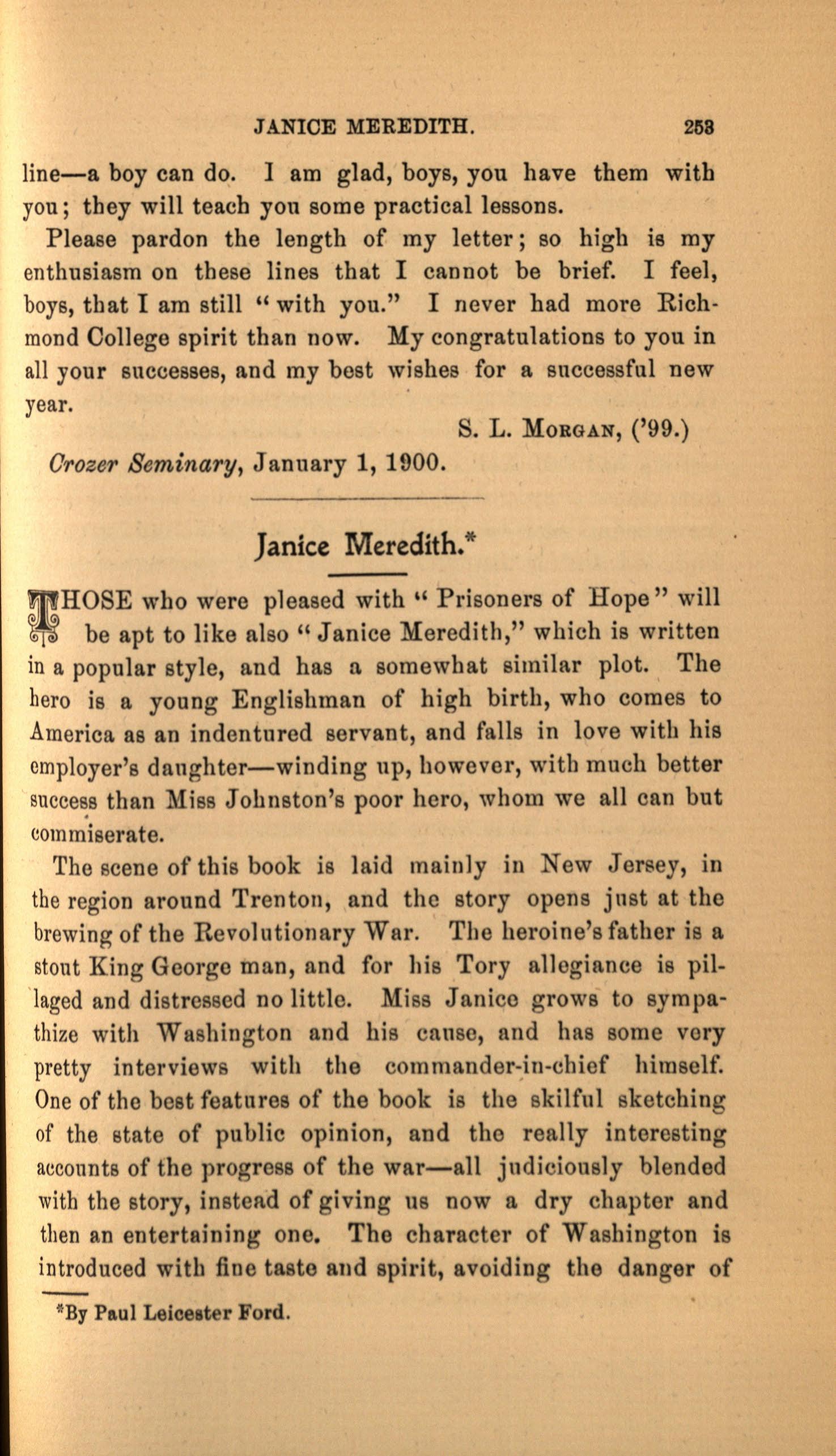
Orozer Seminary, Jan nary 1, 1900.
Janice Meredith.*
~HOSE who were pleased with" Prisoners of Hope" will be apt to like also" Janice Meredith," which is written in a popular style, and has a. somewhat similar plot. The hero is a young Englishman of high birth, who comes to America as an indentured servant, and falls in love with his employer's daughter-winding up, however, with much better succe~sthan Miss Johnston's poor hero, whom we all can but commiserate.
The scene of this book is laid mainly in ew Jersey, in the region around Trenton, and the story opens j 11stat the brewing of the Revolutionary War. The heroine's father is a stout King George man, and for his Tory allegiance is pillaged and distressed no little. Miss Janice grows to sympathize with Washington and his cause, and has some very pretty interview with the commander-in-chief himself. One of the best features of the book is the skilful sketching of the state of public opinion, and the really intercstin"' allcountsof the progress of the war-all judiciously blended with the story, instend of giving us now a dry chapter and then an entertaining one. The character of Washington is introduced with fine ta te aud spirit, avoiding the danger of
*By Paul Lelceater Ford.
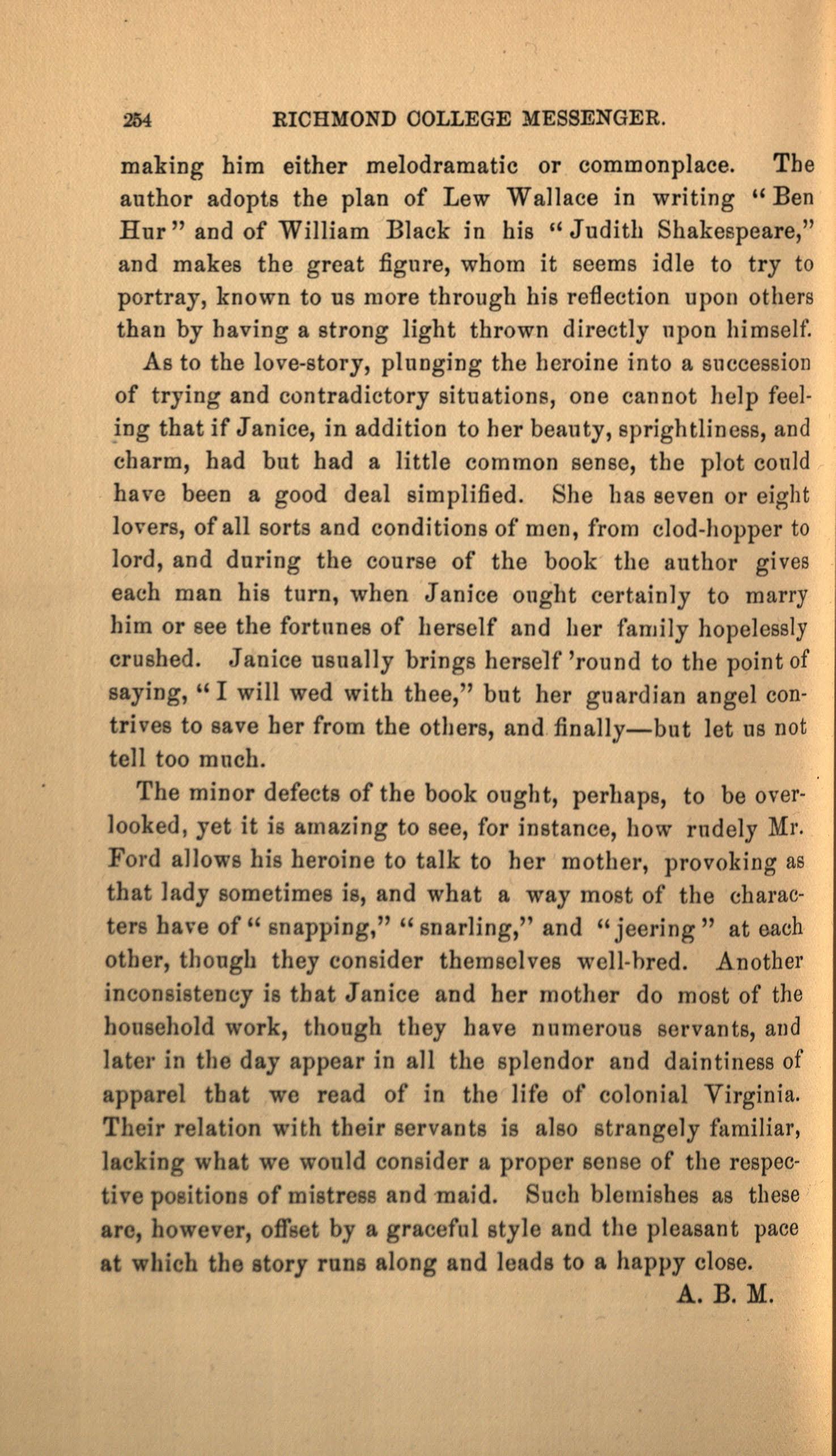
RICHMOND COLLEGE MESSENGER.
making him either melodramatic or commonplace. The author adopts the plan of Lew Wallace in writing "Ben Hur" and of William Black in his "Judith Shakespeare," and makes the great :figure, whom it seems idle to try to portray, known to us more through his reflection upon others than by having a strong light thrown directly upon himself. As to the love-story, plunging the heroine into a succession of trying and contradictory situations, one cannot help feeling that if Janice, in addition to her beauty, sprightliness, and charm, had but had a little common sense, the plot could have been a good deal simplified. She has seven or eight lovers, of all sorts and conditions of men, from clod-hopper to lord, and during the course of the book the author gives each man his turn, when Janice ought certainly to marry him or see the fortunes of herself and her family hopelessly crushed. Janice usna11y brings herself 'round to the point of saying, "I will wed with thee," but her guardian angel contrives to save her from the others, and finally-but let us not te11 too much.
The minor defects of the book ought, perhaps, to be overlooked, yet it is amazing to see, for instance, how rudely Mr. Ford aJlows his heroine to talk to her mother, provoking as that fady sometimes is, and what a way most of the characters have of" snapping," "snarling,'' and "jeering" at each other, t110ugh they consider themselves well-bred. Another inconsistency is that Jan ice and her mother do most of the household work, though they have numerous servants, and later in the day appear in all the splendor and daintiness of apparel that we read of in the life of colonial Virginia. Their relation wHh their servants is also strangely familiar, lacking what we would consider a proper sense of the respective positions of mistress and maid. Such blemishes as these arc, however, offset by a graceful style and the pleasant pace at which the story runs along and leads to a happy close.
A.B.:M.
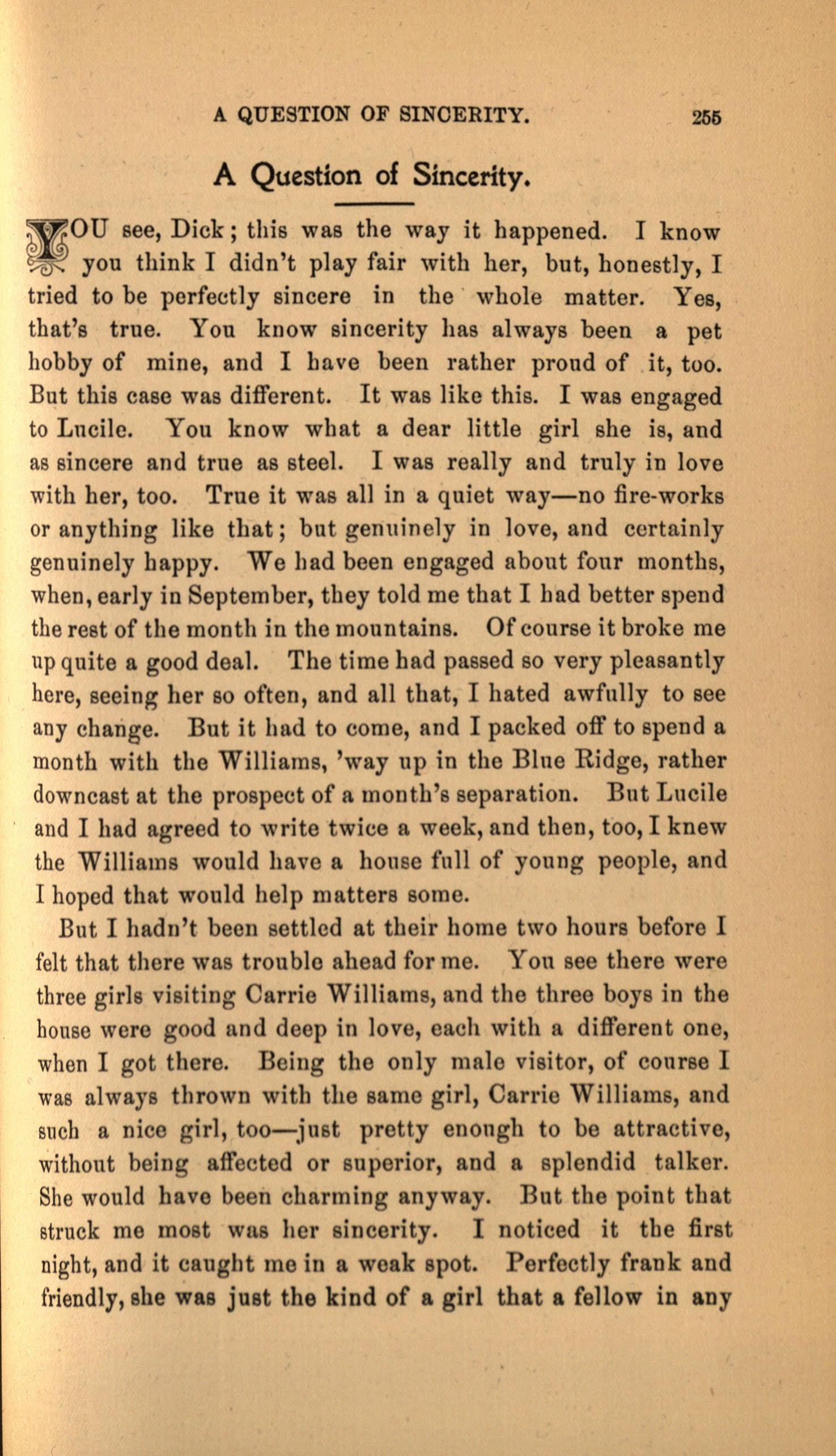
QUEST ION OF SINOERITY.
OU see, Dick; this was the way it happened. I know you think I didn't play fair with her, but , honestly , I tried to be perfectly since r e in the whole matter. Yes, that's true. You know sincer i ty has always been a pet hobby of mine, and I have been rather proud of it, too. But this case was different . It was like this. I was engaged to Lncilc. You know what a dear Iittle girl she is, an d as sincere and true as steel. I was really and truly in love with her, too. True it was all in a quiet way-no :fire-works or anything like that; but genuinely in love, and certainly genuinely happy. We had been engaged about four months, when, early in September , they told me that I bad better spend the rest of the month in the mountains. Of course it broke me up quite a good dea l. The time had passed so very pleasantly here, seeing her so often, and all that, I hated awfully to see any change. But it had to come, and I packed off to spend a month with the Williams, 'way up in the Blne Ridge, rather downcast at the prospect of a months separation. But Lucile and I had agreed to write twice a week, and then, too, I knew the Williams would have a house full of young people, and I hoped that would help matters some.
But I hadn't been ettlcd at their home two hours before I felt that there was trouble ahead for me. on see there were three girls visiting Carrie Williams, and the three boys in the house were good and deep in love, each with a different one, when I got there. Being the only male visitor, of course I was always thrown with the same girl, Carrie Williams, and such a nice girl, too-just pretty enongh to be attractive, without being affected or superior, and a splendid talker. She would have been charming anyway. But the point that struck me most wns her sincerity. I noticed it the first night, and it caught me in a weak spot. Perfectly frank and friendly, she was just the kind of a girl that a feJlow in any
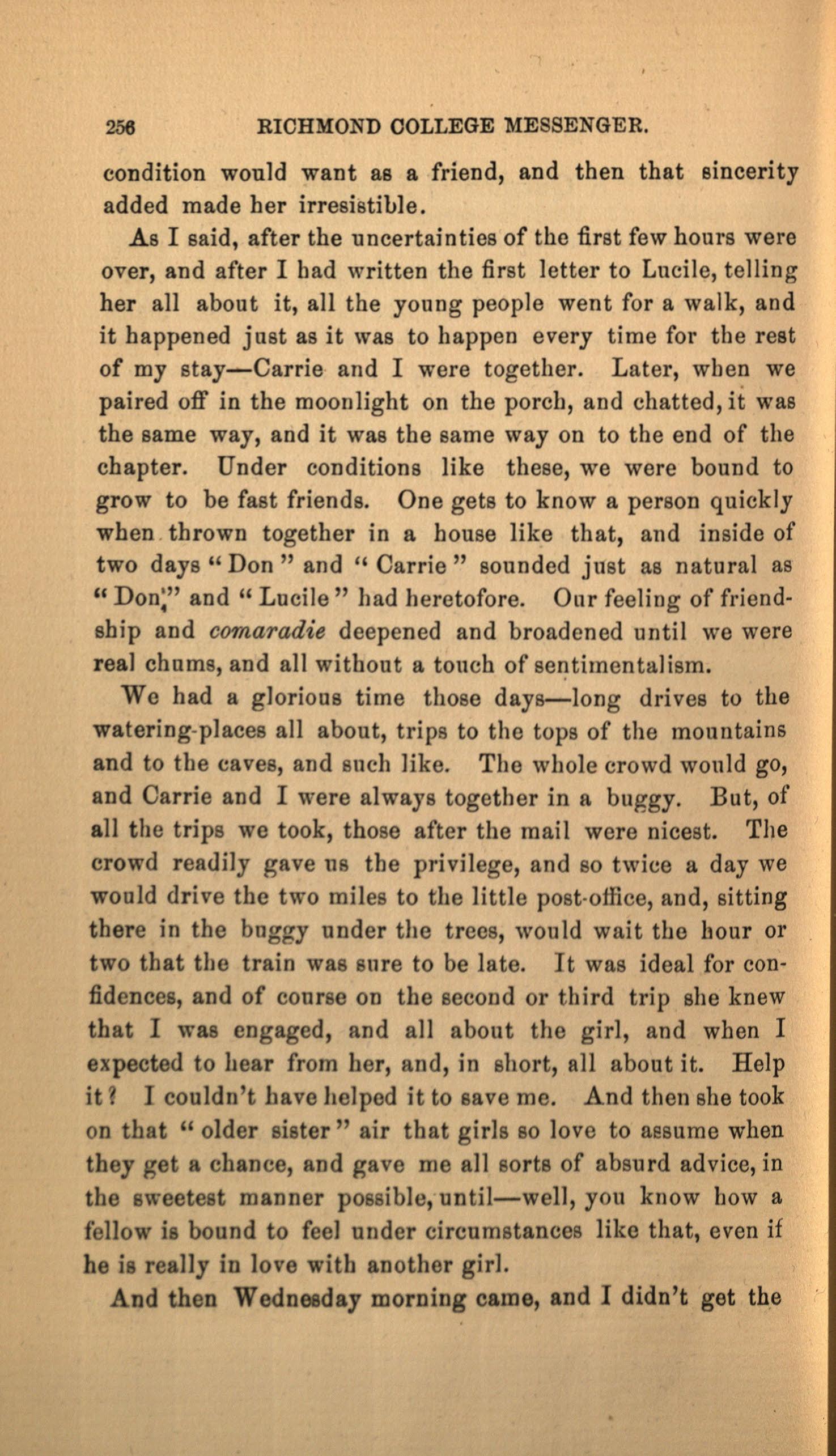
RICHMOND COLLEGE MESSENGER.
condition would want as a friend, and then that sincerity added made her irresistible.
As I said, after the uncertainties of the -firstfew hours were over, and after I bad written the first letter to Lucile, telling her all a.bout it, all the young people went for a walk, and it happened just as it was to happen every time for the rest of my stay-Carrie and I were together. Later, when we paired off in the moonHght on the porch, and chatted, it was the same way, and it was the same way on to the end of the chapter. Under conditions like these, we were bound to grow to be fast friends. One gets to know a person quickly when . thrown together in a house like that, and inside of two days "Don" and " Carrie" sounded jtrst 1;1.snatural as "Don:" and "Lucile" had heretofore. Onr feeling of friendship and comaradie deepened and broadened until we were real chums, and all without a touch of set?timentalism.
We had a glorious time those days-long drives to the watering -places all about, trips to the tops of the mountains and to the caves, and such like. The whole crowd would go, and Carrie and I were always together in a buggy. But, of all the trips we took, those after the mail were nicest. The crowd readily gave us the privilege, and so twice a day we would drive the two miles to the little post-office, and, sitting there in the boggy under the trees, would wait the hour or two that the train was sure to be late. It was ideal for confidences, and of coarse on the second or third trip she knew that I was engaged, and all about the girl, and when I expected to hear from her, and, in short, all about it. Help it? I couldn't have helped it to save me. And then she took on that " older sister" air that girls so love to assume when they get a chance, and gave me a11sorts of absurd advice, in the sweetest manner possible, until-well, you know bow a fellow is bound to feel under circumstances like that, even if he is really in love with another gir1.
And then Wednesday morning came, and I didn't get the

257 letter I expected from Lucile. Of course I had written my second, and mailed it on the down train, sure I would get my letter on the other. And the afternoon train came, and never a sign of a letter. You know how I felt. And Carrie knew what I was expecting, and, though she didn't say a word about it, she was so sympathetically kind about it that I wanted to fight some one then and there. And the next day came and went, and no sign of the letter from Richmond. It seemed to me that every one I knew wrote to me those days, just to make me feel more keenly her not doing it. Lots of mail, bnt no bulky blue envelope, with the tall, slant, school -girl band .-writing I looked for. The next day (Friday) it was the same story over again. And all this time, mind you, Carrie and I had walked and talked and driven and ridden together, until I felt as if I had known her always. She had invented millions of excuses for the missing letter, and been generally so bewitchingly interest ed and friendly that I was sure enough in a bad way. Then Saturday came. I would have sworn that I would get a letter then. My second should have brought an answer by Saturday afternoon. But no letter. This was too much. I had hoped, up to Saturday, that she had not gotten my first letter, or that her answer bad been lost or delayed. But this wouldn't do any longer. Something was the matter in Richmond, and something bad. What could it be i But that was not all, either. Something was the matter at the other end, and something bad, too. I was, or believed I was, (and it wasn't strange either,) desperately in love with Carrie. The friendship that must never, of course, go any farther, ended here, as it always does. I was sure I was madly in love with her. Would I have been if I had gotten the letter i Wellwell that's a different story. But I had some little sense left Saturday night when I thonght it all over and found out where I was. I would not be rnsb. I would go slow. I would wait three days-three long days-and then,

258 RICBMO D COLLEGE MESSENGER.
if no developments came, I would consider myself free. I waited Sunday, Monday, and Tuesday. No developments from Richmond ; but matters were nearing a crisis with me. Something must happen, and happen soon. The strain was too great to stand long. And on Tuesday e\·ening something did happen. I got a letter, and snch a letter-seven pages I And more-seven pages of nothing. I have never seen such an impersonal note in my life. Nothing, absolutely nothing, personal or interesting. The weather, a wedding of people I didn't know, a fire on the next block to her house, and all such stuff as that. othing of what I wanted or needed. It's tone was unmistakeable. A girl doesn't write like that when she cares for a fellow. That settled it. I folded up the letter in silence, trying to keep my face from telling Carrie, who was beside me in the buggy, what I felt, and, after a slight pause, went on talking as if nothing had happened. After tea I went for a walk alone to cool off. It isn't always good to strike when the iron is hot, especially when you are the iron. When I had settled my nerves I went up-stairs and wrote Lucile a note. It was coldly and bitterly pleasant, and its tone was unmistakeable. I was rather proud of it. When that was finished I went down and found Carrie alone on the porch. After a few moments' casual conversation, I got my nerve and told her of my love. I was passionately in earnest, and she saw it. She said nothing in answer to the last appeal I had made for some moments, and then, gently and firmly, though she did have a little tremor in her voice, asked me to tell her the whole story about the other one. This set me back for a moment, but I told her finally the whole, true story, ending up by describing tho letter and declaring that it gave me, without doubt, the freedom for which I had wished since I first met her. he was silent again for a second or too; then quietly and firmly-too firmly for me-she said that she thought I had no sufficient cause to break with the other one. I was bound to Lucile until I wa definitely released, and I must

THE WAY OF THE WORLD.
259 never, never say another word of love to he r until Lucile had released me. Not one word of her own feelings. "It wouldn ' t be right. Just let's be friends, like we were before." And that had to be all .
Next morning I found a teleg r am at my place at breakfast, from father, asking me to come home as soon as possible to help in the office, as one of the clerks was sick.
Of course I had to go that afternoon. After breakfast Carrie and I went for the mail for the last time . On the way back she made me promise to do my very best to make it all up with Lucile when I got home. "Just as if yon had never met me. That would be best," she said. In return I begaed, and finally obtained, the privilege of writing to her once a month, nnd she promised to answer. That was all.
Of coarse-but you know the rest already. I'd best - but look what time it is, man . I ought to have turned in long ago. Sunday night, too. Good night.
WEIRD.
ITH head bowed upon her breast, she stood at the entrance of the great cathedral. A pale, beautiful face, beneath a shadowy hood, bore the indelible marks of living sorrow. Heedless alike of the cnrious passers-by and of the :fitful October wind, which wrapped her garments about her well-moulded figure, she stood irresolute, her eyes bent on vacancy. There was majesty in her solitary grief. An unremembered queen, alone in an unremembering world, she might have been.
Softly from afar, in the choir loft, the gentle murmur of a chant aroee, gradually swellin out as the recessional advanced. "IJeuamisericors---.Deus justus---Dc1M usque misericora"floated out on the cold crisp air. She could hear the words distinctly. A faint shudder passed over her frame;

RICHMOND COLLEGE MESSENGER.
then she turned and passed slowly within the gaping doorway of the church.
The last echo of the receding chant had died upon the incensed air. All was hashed in silence now, save the noise of her footsteps as she hnrried along the resounding corridor. A feeling akin to security passed over her, shut off from the world without. Resolution stamped itself upon her colorless face, as she swept on, on through the vast unpeopled nave, up the spacious aisle, till she stood before the holy altar. Reverently she knelt, with hands clasped upon her bosom, and her lips moved in prayer:
"0 God, the merciful! God, the just l O God, the ever merciful! Take me, vile sinner that I am, in a sin-cursed world. Wretched and repentant am I, who have sinned against Thee ; cast out by the world, which made me what I , am; loved by none, despised by all, forsaken by him I loved better than Ufe, with blind, with passionate devotion. 0 J esu, in divine compassion look upon my guilt. In Thine infinite tenderness, say to my bleeding spirit, ' Oome, and sin no more.' 0, Holy Mother of God, in the name of Him thou didst beget, by the blessedness of thy virginity, do thou have mercy. Rid me of an ac<mrsed life. From a cruel unforgiving world take me to the celestial throne of grace."
Tearless she arose and lifted up her eyes. The dying sun shed a last lingering ray through the diaphanous glass of a vaulted window, lighting with a greenish glare the face of the Obrist in purple. The usually placid countenance was , wreathed in a sardonic smile. He seemed to mock the anguish of her soul. Human she was, and she had sinned. Spurned by the unrelenting world, she bad groped her way through penitential tears to the altar of God, only to be rebuffed. The shock was cruel. Pure in the eyes of God she stood, if God can be be1ieved, but the celestial flame in her breast, not yet educattld to terrestrial law, bad been quenched too late. Beyond the pale of forgiveness she was. Shut in

WAY OF THE WORLD. 261 her face was the door of God's mercy. A noble spirit was shattered. Could she be blamed~
A cold, harsh laugh broke from her lips as she steadfastly gazed at the scornful figure. "A thousand curses on such a God I" she shouted wildly. "Away with Him I Thrice damned be the Autocrat of such justice, as heartless as the unpardoning world of His creation! Let the gates of hell open to receive me; its uery jaws were a boon to my bleeding heart. Fearless I brave the abyss of eternity. There is no God I There is naught but devil I Damn my soul, and he will I"
Io her fury she tore asunder her corsage, and drew forth a poignard. There was a quick flash of steel, a low groan, and her lifeless body fell on the flags about the altar, the blood flowing over her white bosom. An erring soul had flitted to its God. Was the Creator of the cosmos waiting to crown her, mid the glad acclaim of the heavenly host 1
"Father, I have sinned grievously." The words came from a man who knelt before the confessional of the great cathedral. The lines of his handsome face were drawn with pain. Cold beads of sweat stood out npon his brow as he grasped the railing over which ho bent with a death-like clutch. The massive frame trembled. His breath came short and quick.
"The Lord is merciful," said the priest. "Displeasing in His sight is the waywardness of His children, but the Holy Mother makes intercession for thee. How hast thou sinned, man j"
" Thou knowest, father; it is the curse of God upon me."
" Lay not thy short-comings on the Lord, for He was in all points tempted like as we. But His mercy is from everlasting unto everlasting. I am grieved in my heart, my son, that thou hast thus sinned again. When next thou art tempted, remember that the Lord doth not ever offer chance for repentance. Mend thy way, my child, lest thou come
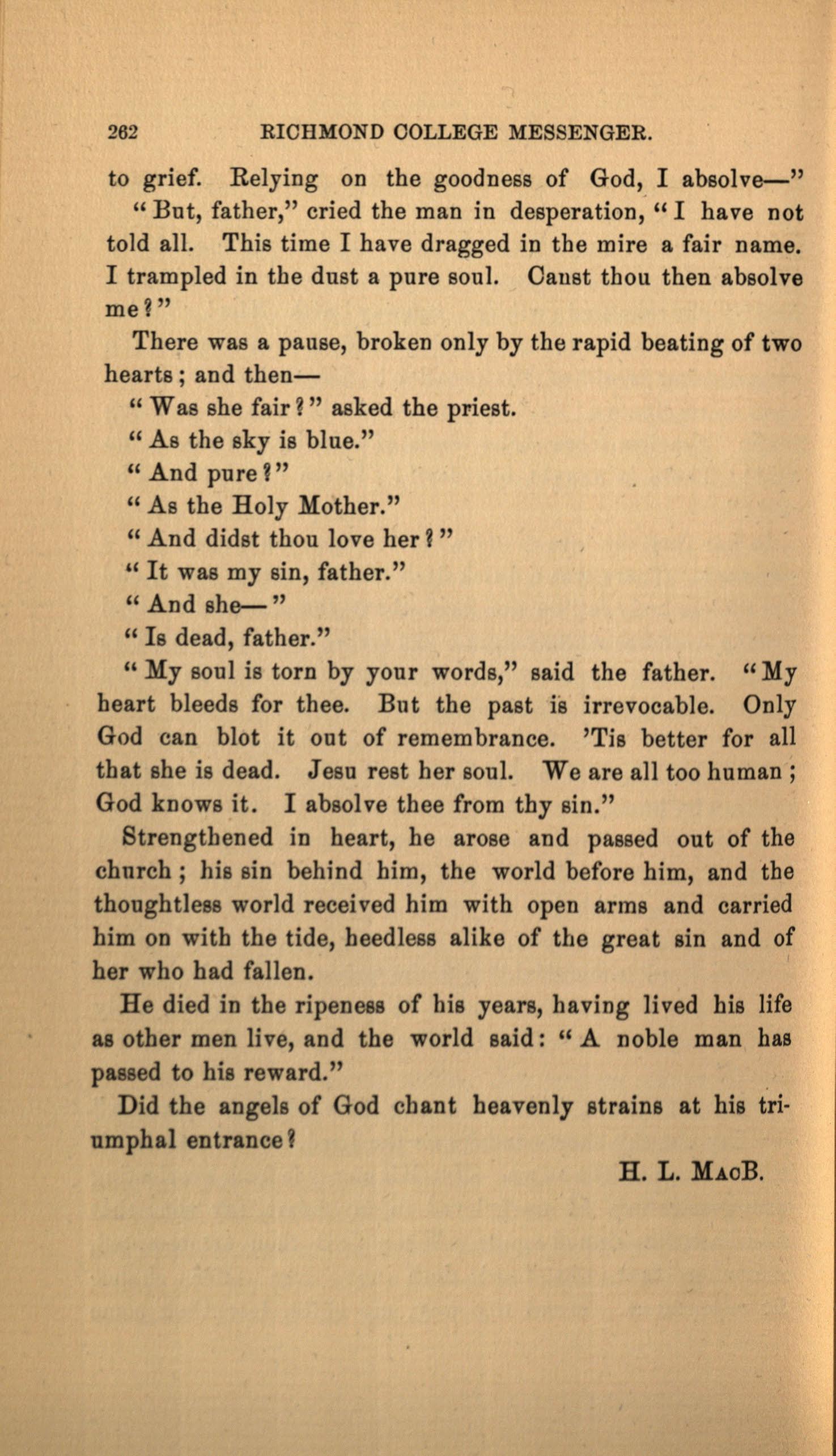
262 RICHMOND COLLEGE MESSENGER.
to grief. Relying on the goodness of God,_ I absolve-" "But, father," cried the man in desperation, "I have not told all. This time I have dragged in the mire a fair name. I trampled in the dust a pure soul. Canst thou then absolve me~"
There was a pause, broken only by the rapid beating of two hearts ; and then-
" Was she fair 1" asked the priest.
"As the sky is blue."
" And pure¥"
"As the Holy Mother."
" And didst thou love her i "
"It was my sin, father."
" And she-"
"Is dead, father."
" My soul is torn by your words," said the father. "My heart bleeds for thee. But the past is irrevocable. Only God can blot it oat of remembrance. 'Tis better for all that she is dead. Jeso rest her soul. We are all too human; God knows it. I absolve thee from thy sin."
Strengthened in heart, he arose and passed out of the church; his sin behind him, the world before him, and the thoughtless world received him with open arms and carried him on with the tide, heedless alike of the great sin and of her who had fallen.
He died in the ripeness of bis years, having lived his life as other men live, and the world said: "A noble man bas passed to his reward."
Did the angels of God chant heavenly strains at his triumphal entrance¥
H. L. MAoB.

!fr!HE American people, living harmoniously and happily under the policy of isolation, have never desired to know much about the colonial systems of the world. But now, when every indication points to our country occupying the responsible position of "protector:, or "mother" in the near future, it would be well to look into the policy which has brought much wealth and scarcely less misery to the dominant powers of the world.
There are 125 colonies, protectorates, A.nd dependencies in existence to-day. These occup! two-fifths of the land surface of the globe, and are peopled with 500,000,000 human beings-one third of the population of the entire world. The United Kingdom, with scarcely 40,000,000 inhabitants, exercises supremacy over more than 344,000,000 ! . Over threefourths of these dependent people live between the Tropics of Cancer and Capricorn, and each of the governing countries lie within the North Temperate Zone. Save on the continent of America, not a single important republic or independent form of government exists in the Torrid Zone.
Twenty colonies or dependencies have their being on North American soil, four in South America, eight in Europe, twenty-one in Asia, twenty-four in Oceania, and forty-nine in Africa. If dependent governments indicate imbecility, North America occupies a shameful position, for she has nearly half as many as Africa, :five times as many as South America, and nearly three times as many as Europe! Commerce constitutes the great motive power behind the governments which have gone forth into foreign fields and fastened their civil power and authority npon weak and semicivilized peoples. Thus we see the United Kingdom, with forty-eight colonies, scattered all over the world, reaping the benefits of an immense trade with them and crowned as "mistress of the seas." Almost vainly imitating her example,
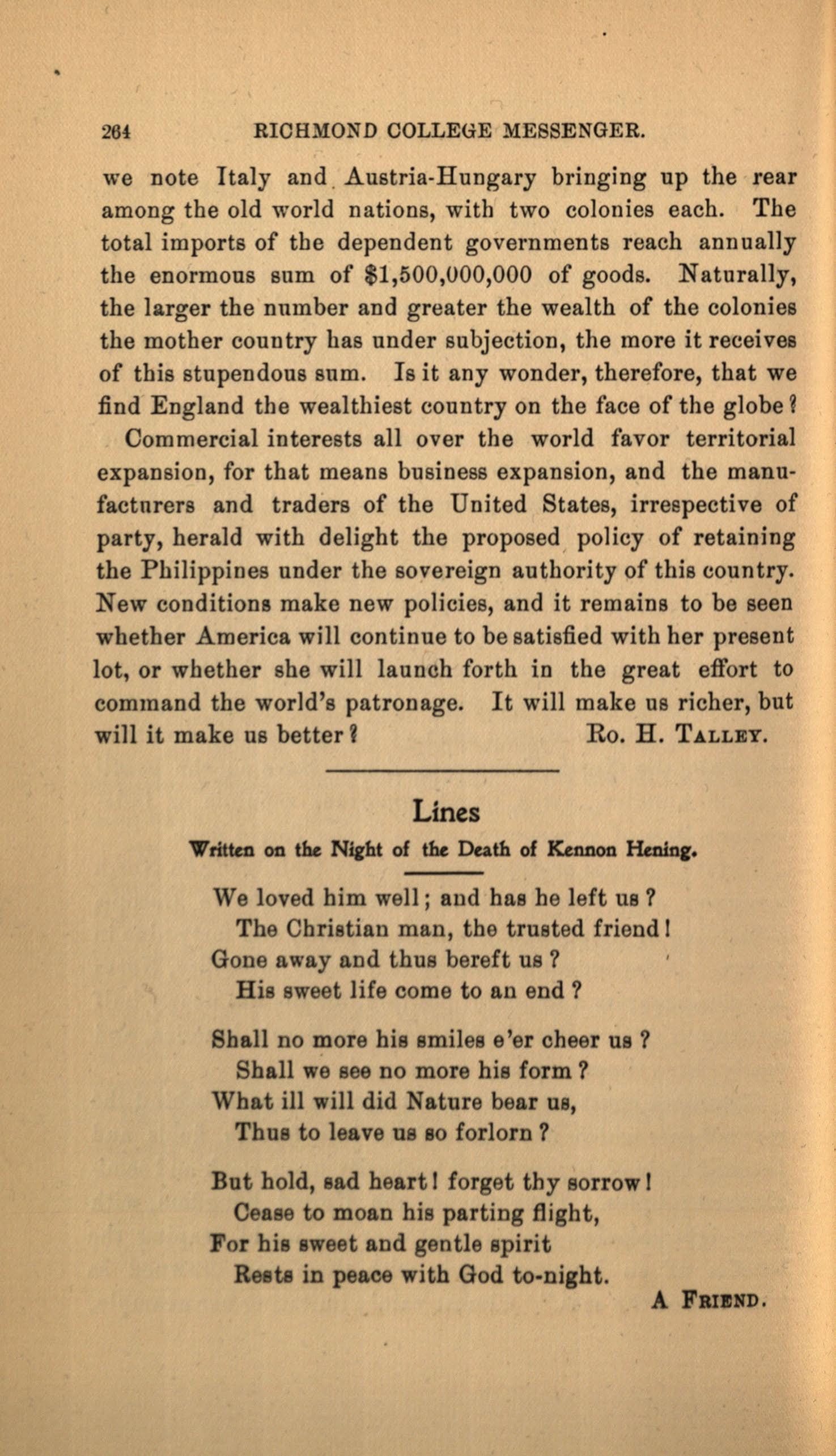
RICHMOND COLLEGE MESSENGER.
we note Italy and . Austria-Hungary bringing up the rear among the old world nations, with two colonies each. The total imports of the dependent governments reach annua11y the enormous sum of $1,500,000,000 of goods. Naturally, the larger the number and greater the wealth of the colonies the mother country has under subjection, the more it receives of this stupendous sum. Is it any wonder, therefore, that we :find England the wealthiest country on the face of the globe i Commercial interests all over the world favor territorial expansion, for that means business expansion, and the manufactnrers and traders of the United States, irrespective of party, herald with delight the proposed , policy of retaining the Philippines under the sovereign authority of this country. New conditions make new policies, and it remains to be seen whether America will continue to be satisfied with her present lot, or whether she will launah forth in the great effort to command the world's patronage. It will make us richer, but will it make us better i Ro. H. TALLEY.
Writtenon the Nifht of the Death of KennonHmmi.
We loved him well; and has he left us ?
The Christian man, the trusted friend I Gone away and thus bereft us ? His sweet life come to an end ?
Shall no more his smiles e'er cheer us?
Shall we see no more his form ? What ill will did Nature bear us, Thus to leave us so forlorn?
But hold, sad heart I forget thy sorrow I Cease to moan his parting flight, For his sweet and gentle spirit Rests in peace with God to-night. A FRIEND.
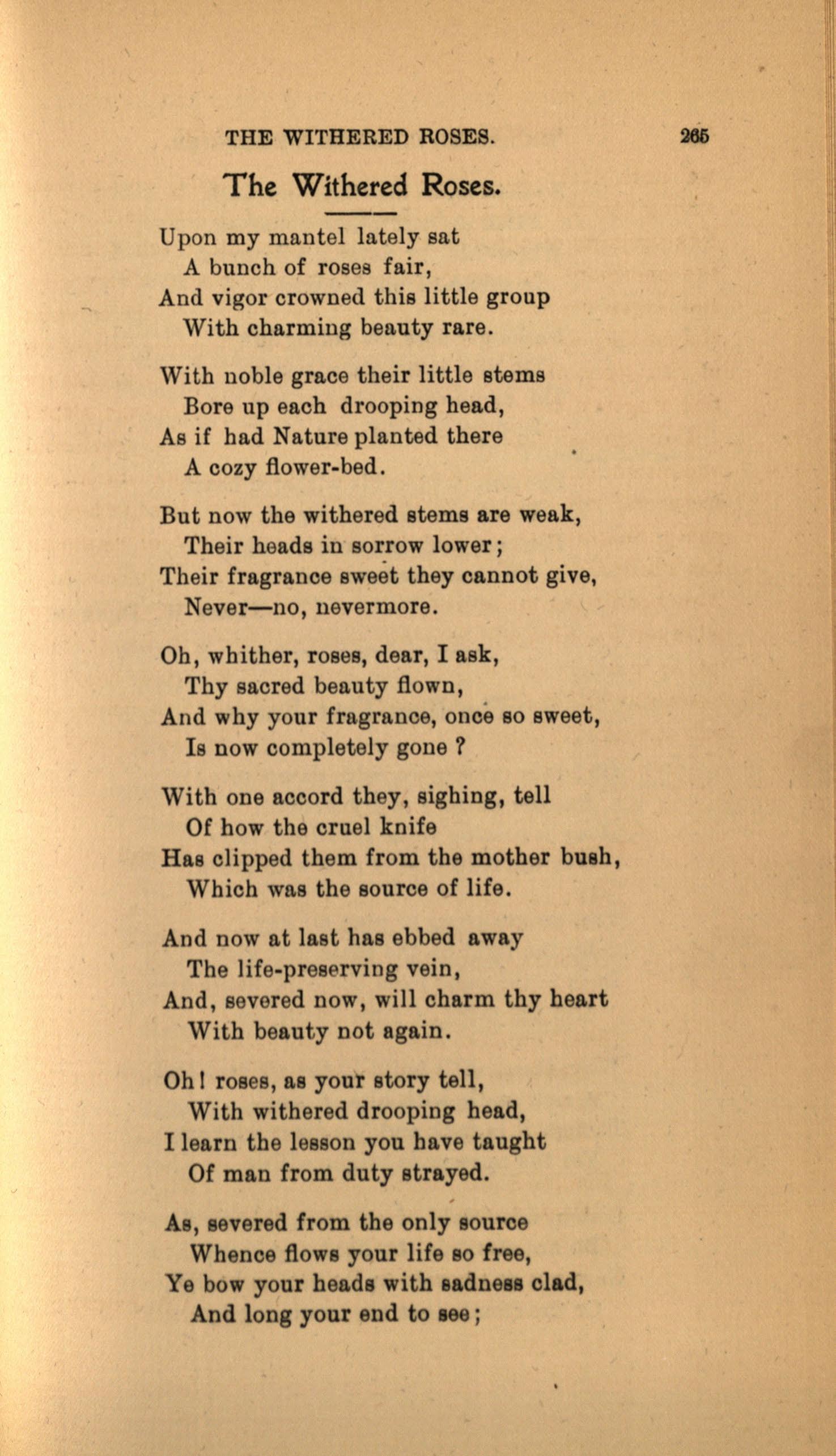
THE WITHERE D ROSES. Th e W ithered R oses.
Upon my mantel lately sat A bunch of roses fair, And vigor crowned this little group With charming beauty rare.
With noble grace their little stems Bore up each drooping bead, As if bad Nature planted there A cozy flower-bed.
But now the withered stems are weak, Their heads in sorrow lower ; Their fragrance sweet they cannot give, Never-no, nevermore.
Oh, whither, roses, dear, I ask, Thy sacred beauty flown, And why your fragrance, once so sweet, Is now completely gone ?
With one accord they, sighing, tell Of how the cruel knife Hae clipped them from the mother bush, Which was the source of life.
And now at last has ebbed away The life-preserving vein, And, severed now, will charm thy heart With beauty not again.
Oh I roses, as your story tell, With withered drooping bead, I learn the lesson you have taught Of man from duty strayed.
As, severed from the only source Whence flows your life so free, Ye bow your heads with sadness clad, And long your end to aee;
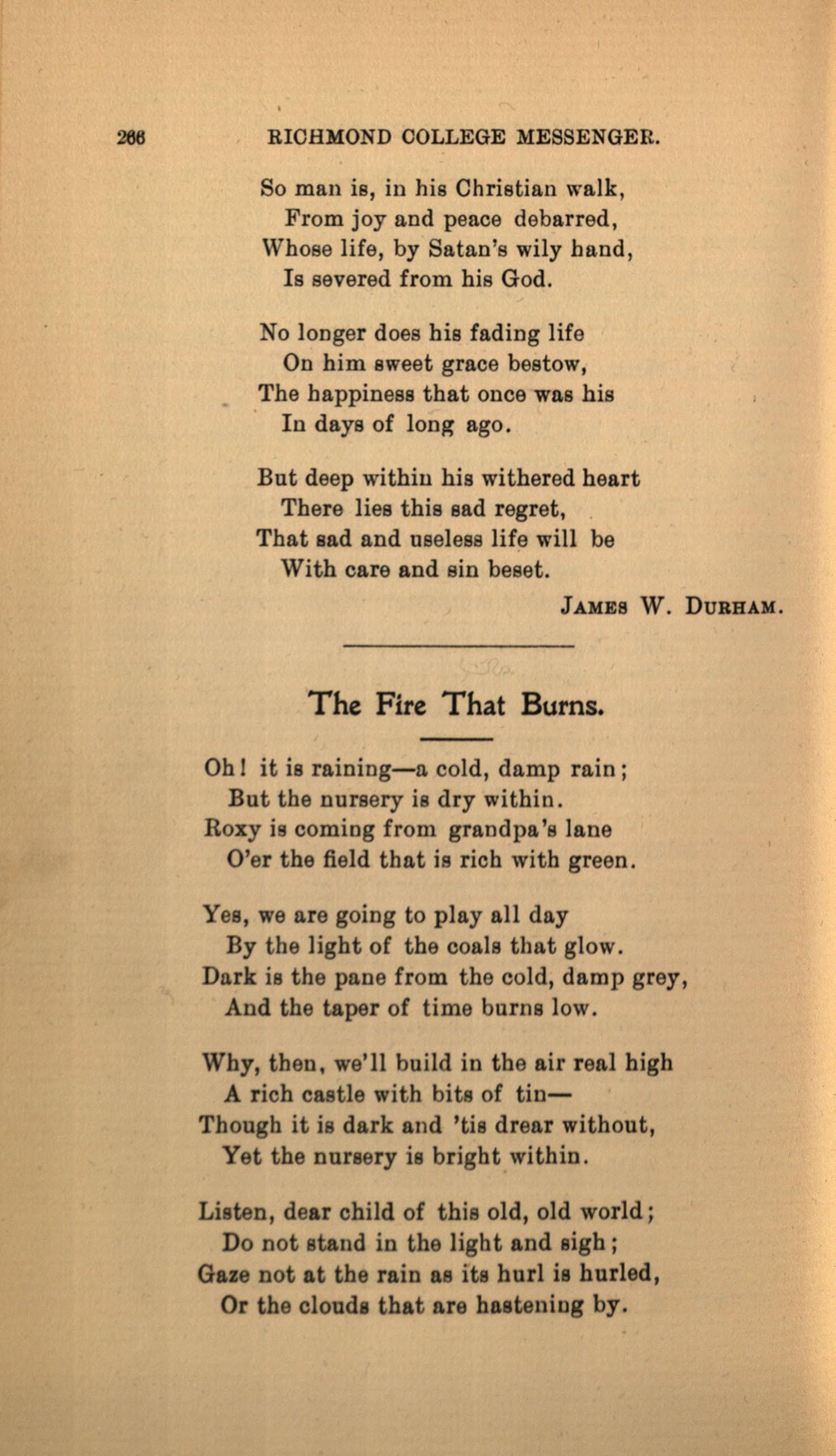
266 RICHMOND COLLEGE MESSENGER.
So man is, in his Christian walk, From joy and peace debarred, Whose life, by Satan's wily hand, Is severed from bis God.
No longer does hie fading life On him sweet grace bestow, The happiness that once was his In days of long ago.
But deep within his withered heart
There lies this sad regret, That sad and useless life will be With care and sin beset.
JAMES W. DURHAM.
Ohl it is raining-a cold, damp rain; Bnt the nursery is dry within. Roxy is coming from grandpa's lane
O'er the field that is rich with green.
Yes, we are going to play all day By the light of the coals that g1ow. Dark is the pane from the cold, damp grey, And the taper of time burns low.
Why, then, we'll build in the air real high
A rich castle with bits of tinThough it is dark and 'tis drear without, Yet the nursery is bright within.
Listen, dear child of this old, old world; Do not stand in the light and sigh; Gaze not at the rain as its hurl is hurled, Or the clouds that are hastening by.
THE AMERICAN SOLDIER.
Play at your games, as the children do By the light of the hearts that glow; Build up your lives, as the children, too, With a worth-an intent to grow.
Life is not lived in the distance 'bout, But in touch with the hearts we winThough it is dark and 'tis drear without, Yet the nursery is warm within.
W. RUSSELL OWEN.

BY LEWIS L. JENNINGS.
Where the storm of battle rages, And the cannon's flash is seen, Where the blood of countless thousands Runs like water on the green ; Where the musket's deadly rattle Breaks the stillness of the air, And the souls of men are passing By the thousands "over there '';
Where the battle cloud is bursting, And the war-god reigns supreme, Where, amid the smoke of conflict, Helmets flash and bright swords gleam;
There you '11 find him, where the combat, Like the ocean, ebbs and flows, And the victory hangs in balance, With his face turned to his foes I
Bravely fighting for hie country
And the flag he loves so true ; And, if need be, bravely dying
For the grand Red, White, and Blue 1
T. B ANFOBD, P/ul,,/opa•.
:I. L HART, Plu/oloria,..
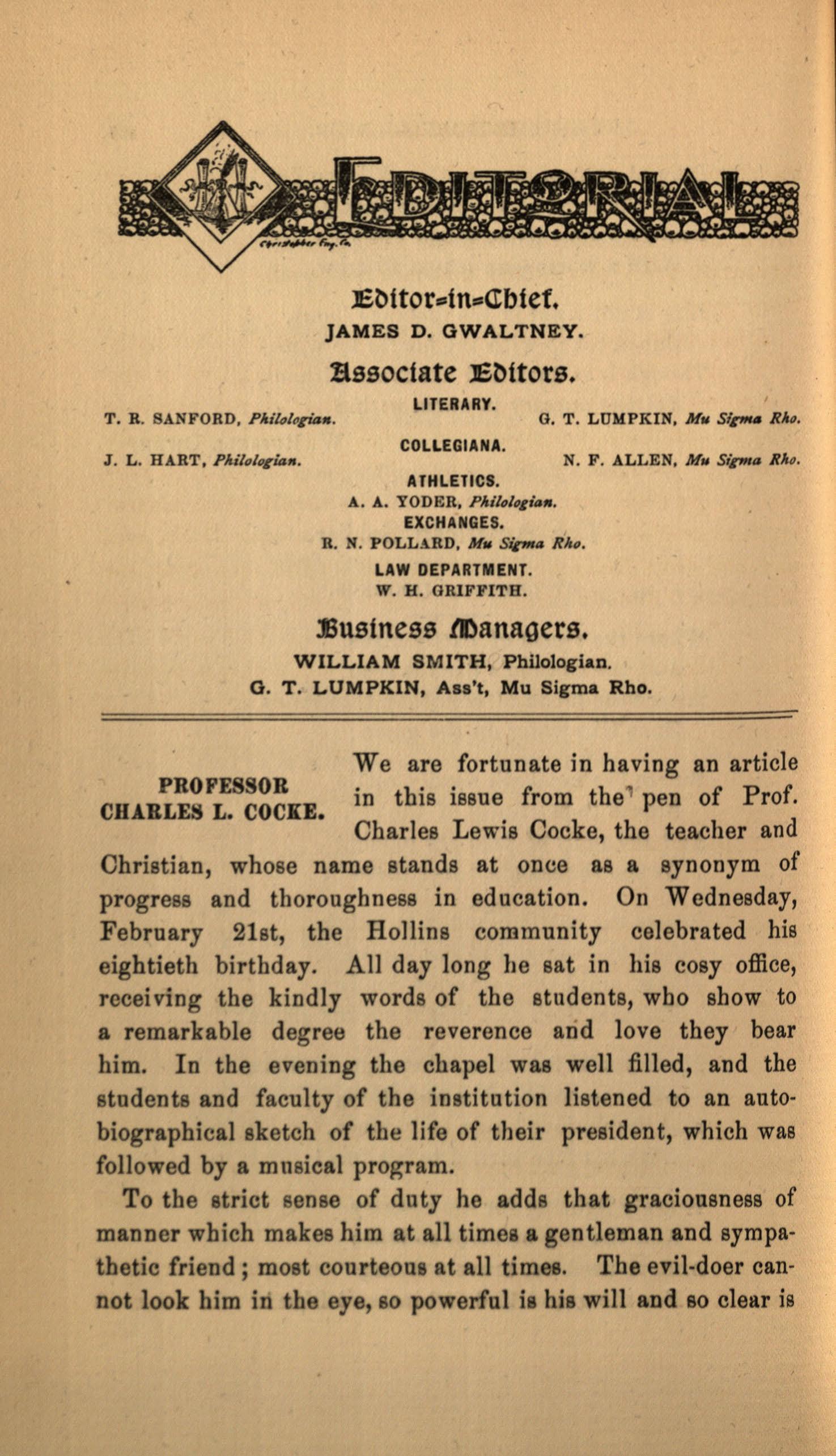
Et,ttor-tn-<tbtef.
JAMES D. GWALTNEY. Bssoctate Et,ttors.
LITERARY. COLLEGIANA. ATHLETICS.
O. T. LUMPKIN, M• Sfr,,u, Rllo.
N. F ALLEN, M• Sip,,to Rl, o.
A. A. YODER, Pllilolo~i4•. EXCHANGES.
R. N POLLARD, M• Spto Rlto. LAW DEPARTMENT
W. H. GRIFFITH.
l3ustnes.s .managers.
WILLIAM SMITH, Philologian .
G. T. LUMPKIN, Asa't, Mu Sigma Rho.
We are fortunate in having an article PROPESSOR f CHARLESL. COCKE. in this issue from the 1 pen of Pro . Charles Lewis Cocke, the teacher and Christian, whose name stands at once as a synonym of progress and thoroughness in education. On W cdnesday, February 21st, the Hollins community celebrated his eightieth birthday. All day long he sat in his cosy office, receiving the kindly words of the students, who show to a remarkable degree the reverence and love they bear him. In the evening the chapel was well filled, and the students and faculty of the in titution listened to an autobiographical sketch of the life of their president, which was followed by a musical program.
To the strict ense of duty he adds that graciousness of manner which makes him at all times a gentleman and sympathetic friend ; most courteous at all times. The evil-doer cannot look him in the eye, so powerful is his will and so clear is
269 his sense of the right. His life is a towering mountain of strength, and an inspiration to the young man who hopes to live a life of real worth. We add here ours to the prayers of thousands in onr South-land that he may be with us for many more years.
A few years since Prof. Charles W. Kent, of the University of Virginia., lectured in Roanoke, nnder the auspices of the Daughters of the Revolution, for the benefit of the building fund of our State institution, which bad suffered so grievously from the ravages of :fire. Two of the Hollins' teachers divided the time with the lecturer in the rendition of several musical numbers. For days after, when Professor Cocke met • any one from Roanoke, he would ask, "Did you bear the lecture on 'Sydney Tavier' ¥" "Did you hear the music~" " Our University and Hollins make our boys and girls 1ive lives of beauty and fineness." And he would stop and smile as if one of his hopes had been realized in seeing HollinB at the top.
Rochester Theological Seminary is proNEW PLAN POR · 1 f, :fi · 1 ·d
STUDENTAID, posrng a new p an or nanma a.1 to its students. In the forthcoming catalogue a change of policy will be announced. In the past, '. aid to needy students has been given at the rate of 100 per year for three years, to students whose percentage of scholarship is 70 or above; those maintaining a standing of 90 per cent. during an entire year receiving an additional $50 the succeeding year. The money thus granted has always been regarded as a loan, to be repaid after the man is settled in his pastorate. As might be expected, there have been, as there always is with every scheme of student a.id, numerous difficulties in the working of this µJan. After next September money will be given to students upon the following plan: For an average standing of 95 per cent. or over during any year, $150 the following year; for 90 to 95 per cent., $125; for 85 to 90


270 RICHMOND COLLEGE MESSENGER.
per cent., $100; for 80 to 85 per cent., $75 ; for 75 to 80 per cent., $50. In past years a considerable number have obtained the extra grant of $50 by good scholarship. Th~s year there are 106 students in the English department of the Seminary. With reference to the change in scholarship awards, Dr. Strong said recently: "Men who are habitua11y unfaithful and slouchy in their men~al work are usually weak morally. Mere zeal and enthusiasm, apart from intellectual ability, are not sufficient to make a man of value to the churches or the world at large. Observation, widely extended, has shown that scholarly attainments and fidelity to wo~k assigned are the best practicable tests of moral iutegrity and the best promise of future efficiency in the ministry. For this reason all aid to students will hereafter be given on the basis of scholarly standing and in the form of scholarshiplil."-The Standard.
" Oh, God I it is a fearful thing IN MEMORI.UI. To see the human soul take wing In any shape, in any mood."
For four years there lived and moved among us a prominent figure whom we all familiarly called "Hening." There was scarcely a more popular man in College circles than was be. But his stay with us was not always to be. For on Wednesday night, March 7th, an unusual welcome rang out through the streets of the Oelestial Oity. Heaven had sent and claimed its own.
We knew him long. We loved him well. We had learned to appreciate the value of such a life, which in so many ways had impressed and fastened itself upon us. He has taught us a lesson of serious earnestness which time cannot efface, and for which Richmond College is deeply indebted to him. There was nothing too great for him-no difficulty that he could not overcome, no obstacle that he could not surmount. His unrelenting, indomitable will know no barrier.

Those of us who remember him in bis earlier College career can never forget the cheerfulness with which he endured the privations and the silent dignity with which be submitted to the mortifications of adverse fortune, the resolution with which he laid aside the depressing memories of the past, and the unrelaxing energy with which he applied himself to meet the needs of the hour.
The fine gold of his nature seemed to have been tempered t o stand the fiery test of adversity. Surely he did great things amid trifles and nourished sublime hopes amid perplexing cares.
A s a scholar no man was more attentive and eager to learn than was ·he. Though burdened with many cares, his ambitious spirit strove hard to attain to the topmost round in the educational ladder.
As a Christian he was sincere-consecrated. We beheld in him a character which, if not perfect, concealed its faults by its many virtues. There was indeed in his nature a vein of gentleness and tenderness. His natural purity and dignity, moulded by Christ-like simplicity, gave him a noble bearing, before which vice instinctively cowered. No man could live at Richmond College without in some measure imbibing his spirit of liberality, cheerfulness, earnest devotion, and consecration to the cauee of Obrist. If ho could be happy while traveling a way beset with cares and obstacles, we wonder what ecstatic joy filled his soul ~s he touched the pavements of the City of the Heavenly Jerusalem. If he delighted to sing the songs of Zion while passing through the dark valleys of this life, we wonder what sweet melody be strnck up when he reached the summit of the everlasting hills. And yet why do we wonder, for we fancy we can hear him singing: 11 Unto Him that loved us, and washed us from our sins in His own blood, and hath made us kings and priests unto God and His Fatb'er; to Hirn be glory and dominion, for ever and ever. Amen."

RIOHMOND COLLEGE MESSENGER.
Situated just west of our campus is one of HOME FOR Richmond's noblest charities, the Home for IN CURA.BLES. Incurables. The splendid new building, of light brick, is an ornament to the city. Among the notable gifts to this institution the past year were $1,000 from Mrs. Virginins Newton and $5,000 from an unknown friend. The work of the Auxiliary, of which Miss Mary W. Thomas is President, has been exceedingly gratifying. To this enterprise, so purely benevolent, we wish all success A city is not so many buildings, so many miles of streets, so many thousands of population; it is a fuller and .intenser expression of the life of man, a co-operative and nobler service in thought, in art, in mercy, to the world's progress. To the realiza tion of this ideal ~ichmond is impelled by its historic traditions and its present tidal prosperity.
FAREWELL. And now, after twelve months' of continuous service, the editor-in-chief lays down the historic and eulogistic pen, and resigns an uneasy chair in favor of the incoming officer.
" Farewell I Farewell I 'Tis a lonely sound, And alway s brings a sigh " to him who is leaving a work he loves. Change, however, is a condition of progress, whose onward march we would not arrest.
Many and intricate are the little problems of editing a college magazine, but few other departments of college work are half so instructive or fascinating, and, in spite of the incessant toil, we have enjoyed our labors. The mission of a co11ege monthly, as we understand it, is to reflect the literary life of the college, and its ideal should be to lead this life to higher and fuller attainments.
One year ago, with trembling hand and troubled brain, we entered upon our duties, and the result of our labors must be its commentary. A glance at the past and its prophecy for

the future is not without encouragement. The most hopeful sign which reveals itself is a greater and more general literary activity, without which the editor must either be a voluminous writer himself or else degenerate into merely a "middle man" between students and printers-a receiver on the one hand, a transmitter on the other.
We have been fortunate in having a larger n nm ber of articles than our predecessors from which to select, but the same criticism may be applied to most of those that have come to our table-they are too much on the order of stereotyped historical narrative. Some biographical and historical sketches should find a place in every well-conducted college magazine, but such sketches should not be of the lifeless, cyclopredic order, which is now so much in evidence. The college magazine should he, above all things else, a symposium of the best thoughts, clothed in the best language, of the students who contribute to itR pages, and not a receptacle for valedictories, debates, orations, class essays, and a dozen other varieties of old material. We have striven faithfully against the insertion of such compositions, but circumstances have sometimes overwhelmed us. Our trials, our successes, our ideals, are now passed into history, and we turn to salute and welcome the new editor-in-chief, than whom there is none among us more talented or more worthy.
To the associate editors and to the business managers, who have shared our labors, we express our highest appreciation for cordial and sympathetic co-operation in all our efforts to make THE MESSENGER a magazine worthy the institution whose name it bears.
The Duke of Westminster and Dwight L Moody died on the same day. The Duke was famous as the richest man in England; Moody, as the most useful of God's servants. An hour before his death Moody said: "I have always been an ambitious man-not ambitious to lay up wealth, but to find work to do."

The Thomas Lectures took place in the College Chapel February 13th, 15th, 16th, 19th, and 20th. Prof. Benj. Ide Wheeler was the lecturer of the occasion. The subjects of the lectures were: (1) "Greece as the Home of Greek History." (2) '' The Attitude of the Greek Toward His State." (3) " The Attitude of the Greek Toward His Gods." (4) "Religion and Art." (5) "Fashion and Etiquette." The lecturer is a man of rare ability and classical attainments. As a teacher of Greek, American soil cannot claim his superior. His lectures were characterized by that profundity of thought and expression of culture which their noble benefactor fotended they should give to the students and the Richmond public.
The chemical laboratory is a :fine place for developing the dormant sentimentalism of the bashful youth and blushing maiden. It was only a few e\'eniogs ago that Miss --and Mr. -- came to the experiment of bleaching flowers with sulphur dioxide, when the fair damsel said to the gallant youth, " Where shall we get the rose with which to perform this experiment j" He replied, "Why, Miss --, a very pretty one may be found upon your cheeks."
We have heard it said that the Roman epicures could tell by the taste of a partridge which leg he slept on the night before being killed. But Dr. " Boaty" can beat that. His sense of smell is so acute that he can walk by a boy's coalbox and tell how many kinds of coal he has in the box by the smell of the different ga ses, and thus he calls the boys to account, and warns them to stop "swiping" coal.
The Cotillon Club got to feeling a little funny about their heels some time ago, and so they decided to give vent to their

exultation in a little dance in the cottage formerly occupied by Professor Mitchell ; but pilot Boatwright tnrned their course / so they steered straight for Floyd avenue, and there they cast anchor. They report a gay time.
Dr. S. E. Woody, president of Kentucky Chapter of Richmond College Alumnre, writes that his chapter will hold their annual banquet in May. The dinner given at the Galt House by this chapter last year, during the session of the Southern Baptist Convention, was very largely attended by alumnre from all over the State.
The sick boys at the hospitals are doing well under the care of the knowing doctors and gentle maiden nurses.
"0 woman, in our hours of ease, Uncertain, coy, and hard to please, * * * * * * * * * When pain and anguish wring the brow A miuistering angel thou."
President Boatwdght and Secretary Ryland were in Washington last week looking after the interests of the Richmond College claim before Congress. Senator Martin and Captain Lamb, representative of the Third District, are vigorously pushing this claim, and hope to secure its payment by the present Congress.
Dr. Peter Goldsmith, pastor of the Temple Church and Vice-President of Temple College, Philadelphia, spent two days on the campus. He expressed himself as delighted with Dr. Wheeler's lectures. Dr. Goldsmith is one of the Southern men who has gained prominence in the North.
The Graduating Class met last week and elected the following officers to represent them in the next commencement: F. W. Moore, President; --Campbell, Vice-President; G. T. Lumpkin, Orator; H. Lee McBain, Historian; Carlyle Broaddus, Secretary; A. T. King, Treasurer.

The boys who represented the College Y. M. C. A. in the State Convention, held in Hampton February 15-18th, were S. M. Sowell, J. L. Hart, S. T. Mathews, J. W. Shepard, and J. W. Durham. They report a grand time, both socially and religiously.
Dr. Mu11ins,of the Southern Baptist Theological Seminary, Wl:!-S with us in our morning worship last month, and favored us with an excellent address. It was a great pleasure to the boys who expect to attend this Seminary to meet Dr. Mu1lins.
We learn that the" Jacksons' " day of judgment is near at hand. Coachers Coleman and Fitzhugh are beginning their lectures on Second Minor, and warning their comrades to be ready to meet the great Judge (Gregory) when he comes.
Well, the examinations are all gone, but the scars are there yet. Some of the " rats " are looking lean and lanky, their eyes gone in nibernis, and their hair much thinner for having undergone this torturing ordeal.
Professor Mitchell is already planning his trip to Paris during the time of the Exposition. Several of the boys are contemplating going with him, as is evidenced by the French (i) twang in their speech.
The Lyceum lectures have been well attended by the students, who have the privilege of the whole course for only one dollar. This illustrates one of the many advantages which a college in the city has.
Three of the professors and several of the students are organizing a chess club. We suppose their motto will be, "All work and no play makes Jack a dull boy."
We are grieved to learn of the painful accident to Professor :Mitchell a few days ago. While getting on the street-car he had his leg very badly hurt.

It gives us pleasure to see Dr. Hunter at his post of duty again, and to watch the wind as it blows through his new spring suit of black whiskers.
If you don't believe that Sowell enjoys singing "Bleat be the Tie that Binds" at a banquet, ask him, and he will tell you.
Mr. Measles and Mrs. Mumps have been making us quite a protracted visit. We will rejoice at their departure.
We were glad to see on our campus a few days ago two of our old boys, A. Paul Bagby and J. Theodore Bowden · .
Among those who have led the chapel services during the past month are Judge Barksdale and Professor Hovey.
Be sure to read the digest of Professor Wheeler's lectures in the Religious Herald by Dr. Kellogg.
Prof. S. C. Mitchell lectured on March 3d at Hollins
Institute.
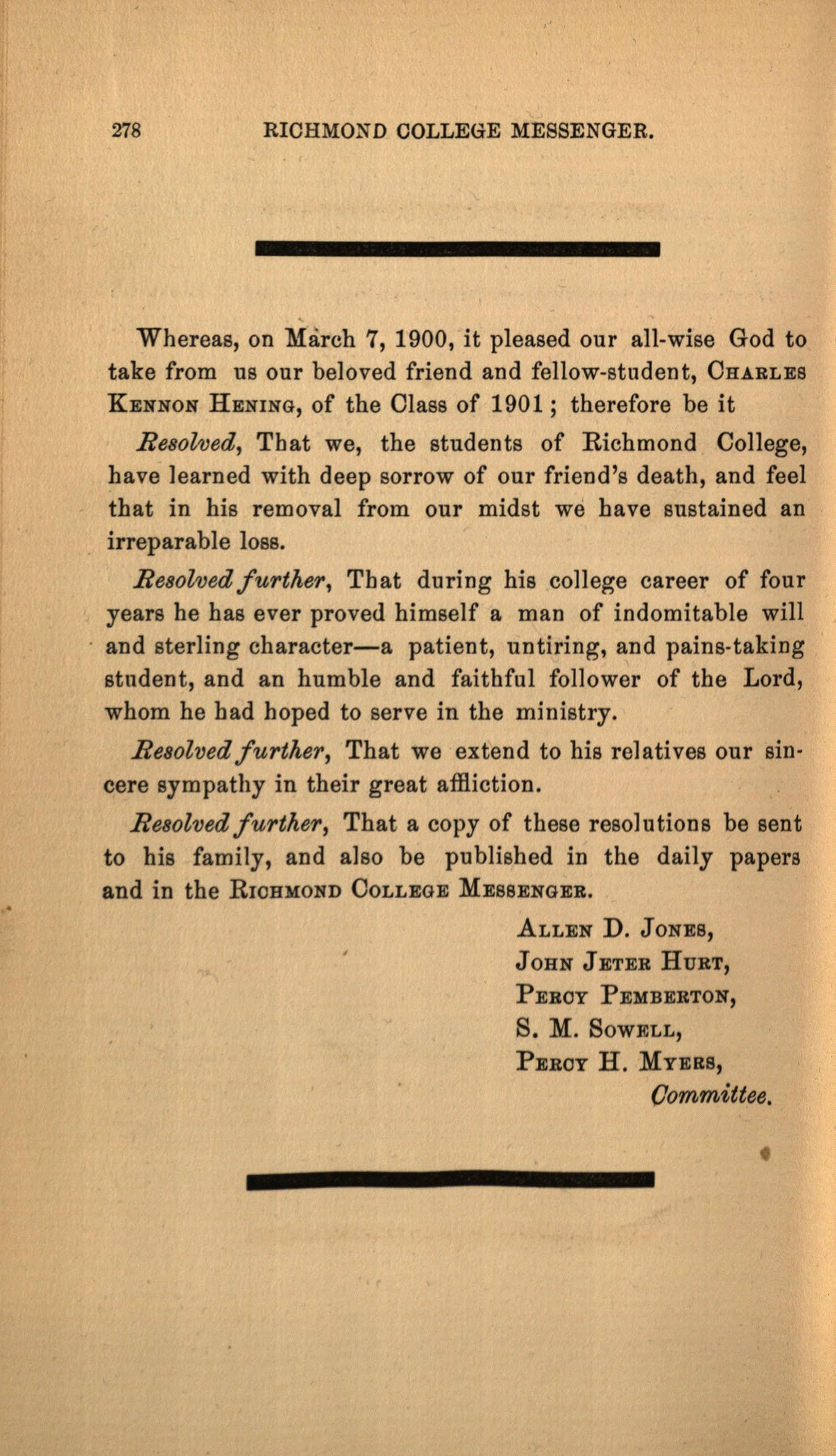
'
Whereas, on March 7, 1900, it pleased our all-wise God to take from us our beloved friend and fellow-student, CHARLES KENNONHENING,of the Class of 1901; therefore be it
Resowed, That we, the students of Richmond Co1lege, have learned with deep sorrow of our friend's death, and feel that in his removal from our midst we have sustained an irreparable loss.
Resowed further, That during his college career of four years he has ever proved himself a man of indomitable will · and sterling character-a patient, untiring, and pains-taking student, and an humble and faithful fo11ower of the Lord, whom he had hoped to serve in the ministry.
Resolved further, That we extend to bis relatives our sincere sympathy in their great affliction.
Resolved further, That a copy of these resolutions be sent to his family, and also be published in the daily papers and in the RICHMONDCOLLEGEMESSENGER.
ALLEN D. JONES, JOHN JETER HURT, PEBOY PEMBERTON' s. M. SOWELL, PEROYH. MYERS, Oommittee.

Resolutions adopted by the Philologian Literary Society of Richmond College, March 8, 1900:
Whereas our Heavenly Father, in His all-wise providence, has seen fit to call from among us our beloved friend and fellow-member, C. KENNONHENING; therefore be it
Resolved, 1. That in this affliction we recognize one of the mysterious manifestations of God's providence, yet we bow in humble submission to His will, saying: "The , Lord gave and the Lord hath taken away."
2. That the Philologian Society has lost a worthy and loyal member, one whose influence will ever live among us .
3. That we, sharing in the bereavement, deeply sympathize with the grief-stricken family, relatives, and friends.
4. That these resolutions be published in the Richmond papers, recorded in the minutos of this Society, and a copy sent to the family of our departed friend.
J. W. KINCHELOE, E. T. POULSON, wIL LIAM S:MITH, Committee.
Mr. Hening's family desires to take this means of public l y expressing their appreciation and heart-felt thanks to the students, faculty, and Philologian Society for their many expressions of sympathy and their courteous services to the bereaved family in their recent deep affliction.
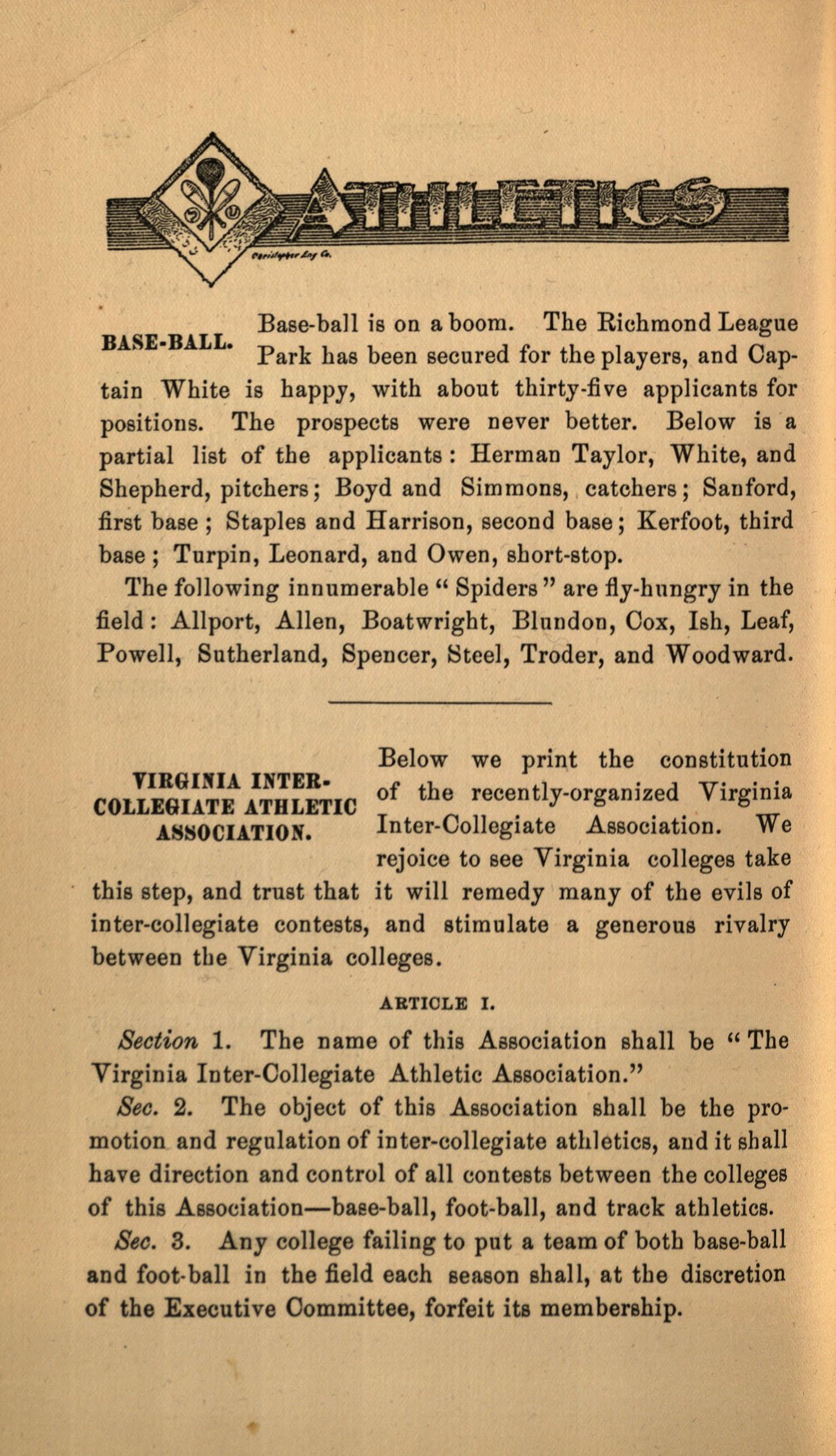
Base-baJl is on a boom. The Richmond League BASE-BALL. Park has been secured for the players, and Captain White is happy, with about thirty-five applicants for positions. The prospects were never better. Below is a partial list of the applicants: Herman Taylor, White, and Shepherd, pitchers; Boyd and Simmons, , catchers; Sanford, first base ; Staples and Harrison, second base; Kerfoot, third base; Turpin, Leonard, and Owen, short-stop.
The foHowing innumerable" Spiders" are fly-hungry in the field: Allport, Allen, Boatwright, Blundon, Cox, Ish, Leaf, Powell, Sutherland, Spencer, Steel, Troder, and Woodward.
Below we print the constitution of the recently-organized Virginia Inter-Collegiate Association. We rejoice to see Virginia colleges take this step, and trust that it will remedy many of the evils of inter-collegiate contests, and stimulate a generous rivalry between tbe Virginia colleges.
Section 1. The name of this Association shall be "The Virginia Inter-Collegiate Athletic Association."
Sec. 2. The object of this Association shall be the promotion and regulation of inter-collegiate athletics, and it shall have direction and control of all contests between the colleges of this Association-baee-ball, foot-ball, and track athletics.
Sec. 3. Any college failing to put a team of both base-ball and foot-ball in the field each season shall, at the discretion of the Executive Committee, forfeit its membership.

Section 1. This Association shall consist of Hampden• Sidney College, Randolph-Macon College, Richmond College, University of Virginia, Washington and Lee University, Virginia Polytechnic Institute, Virginia Military Institute; William and Mary College, and such other colleges as may hereafter be elected.
Seo. 2. No college shall hereafter be admitted except by a two-thirds vote at a regular or called meeting of the Association.
Seo. 3. The annual assessment .for each college shall be five dollars ($5.00) per annum; from this sum two trophies shall be purchased, one for the winner in each section. These purchases shall be made by the Secretary, with the advice of the President.
Sec. 4. Any college failing to remit its annual assessment to the Treasurer on or before April 1st of each year shall forfeit its membership in the Atisociation.
Section 1. The officers of this Association shall consist of a President, Vice-President, a Secretary, and Treasurer, and an Executive Committee, the Executive Committee to consist of three members, and the President of the Association to be ex-officiochairman. All officers shall be elected at the annual meeting, and the college holding the presidency or other office shall not be eligible to hold the same office the succeeding year. Furthermore, the President shall be an alumnus of one of the institutions represented, and neither the President nor any member of the Executive Committee shall be eligible to play on any team of this organization.
Section 1. There shall be one regular meeting in each year, to be held on the second Friday in January, at the place designated at the previous meeting.
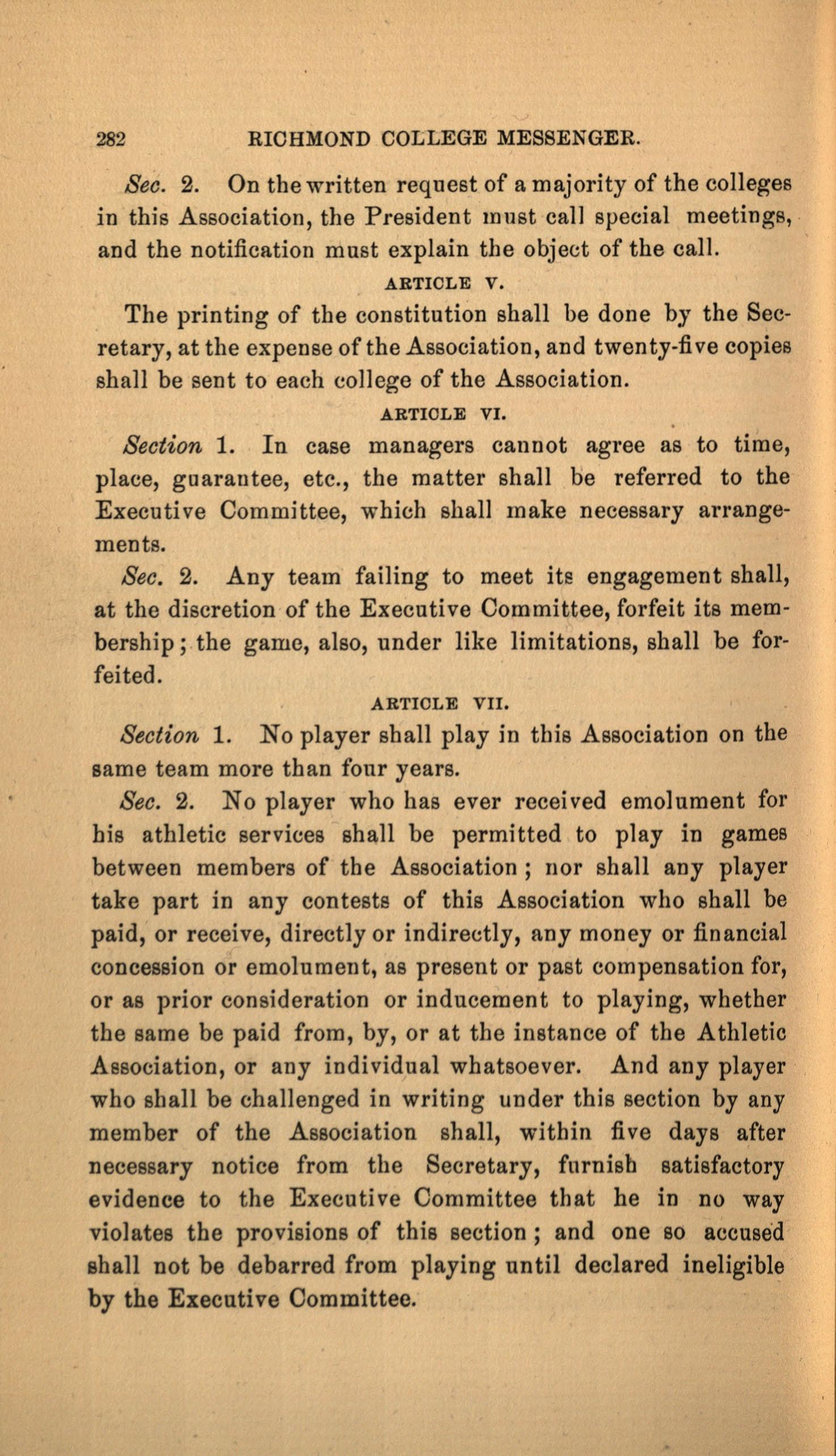
Sec. 2. On the written request of a majority of the colleges in this Association, the President must call special meetings, and the notification must explain the object of the call.
The printing of the constitution shall be done by the Secretary, at the expense of the Association, and twenty-fl ve copies shall be sent to each college of the Association .
.A.RTIOLE VI.
Section 1. In case managers cannot ag1·ee as to time, place, guarantee, etc., the matter shall oe referred to the Executive Committee, which shall make necessary arrangements.
Sec. 2. Any team failing to meet its engagement shall, at the discretion of the Executive Committee, forfeit its membership; the game, also, under like limitations, shall be forfeited.
Section 1. No player shall play in this Association on the same team more than four years.
Sec. 2. No player who has ever received emolument for his athletic services shall be permitted to play in games between members of the Association; nor shall any player take part in any contests of this Association who shall be paid, or receive, directly or indirectly, any money or financial concession or emolument, as present or past compensation for, or as prior consideration or inducement to playing, whether the same be paid from, by, or at the instance of the Athletic Association, or any individual whatsoever. And any player who shall be challenged in writing under this section by any member of the Association shall, within five days after necessary notice from the Secretary, furnish satisfactory evidence to the Executive Committee that he in no way violates the provisions of this section ; and one so accused shall not be debarred from playing until declared ineligible by the Executive Committee.

Sec. 3. On demand of the manager, the captain of one team shall immediately forward to the other captain the names of his players; from the list thus furnished he ehall choose bis team.
Sec. 4. No one shall be eligible to play in this Association who is not a bona fide student of the college on whose team be plays, who is not matriculated for the then current year, and who is not 1·equired to attend at least five recitations per week.
ARTICLE VIII.
Section 1. There shall be two umpires for each game of base-ball-one for balls and strikes and one for bases; and neither shall be a member or an alumnus of either college contesting, except with the consent of the manager of each team. The conditions mentioned above shall hold in regard to foot-ball officials.
AU decisions must accord with the rules of the National League of Base-Ball Clubs. The rules of the American Inter-Collegiate Foot-Ball Guide shall govern the games of foot-ball in this Association.
Sec. 2. This Association shall be divided into two sections, Eastern and Western. The Eastern section shall consist of Richmond College, Hampden-Sidney, Randolph-Macon, and William and Mary College ; and the Western section shall consist of Roanoke College, Virginia Polytechnic Institute, Washington and Lee University, University of Virginia, and Virginia Military Institute. The team in each section shall play every team in its own section, and the winner of each section shall play for the championship of the State. 'l'he championship shall be decided by the percentage of games won.
ARTIOLE IX.
A majority vote shall be necessary to pass any motion, and a two-thirds vote to alter or amend this Constitution.
ARTIOLE X,
All things unprovided for by this Constitution shall be under the jurisdiction of the Executive Committee.
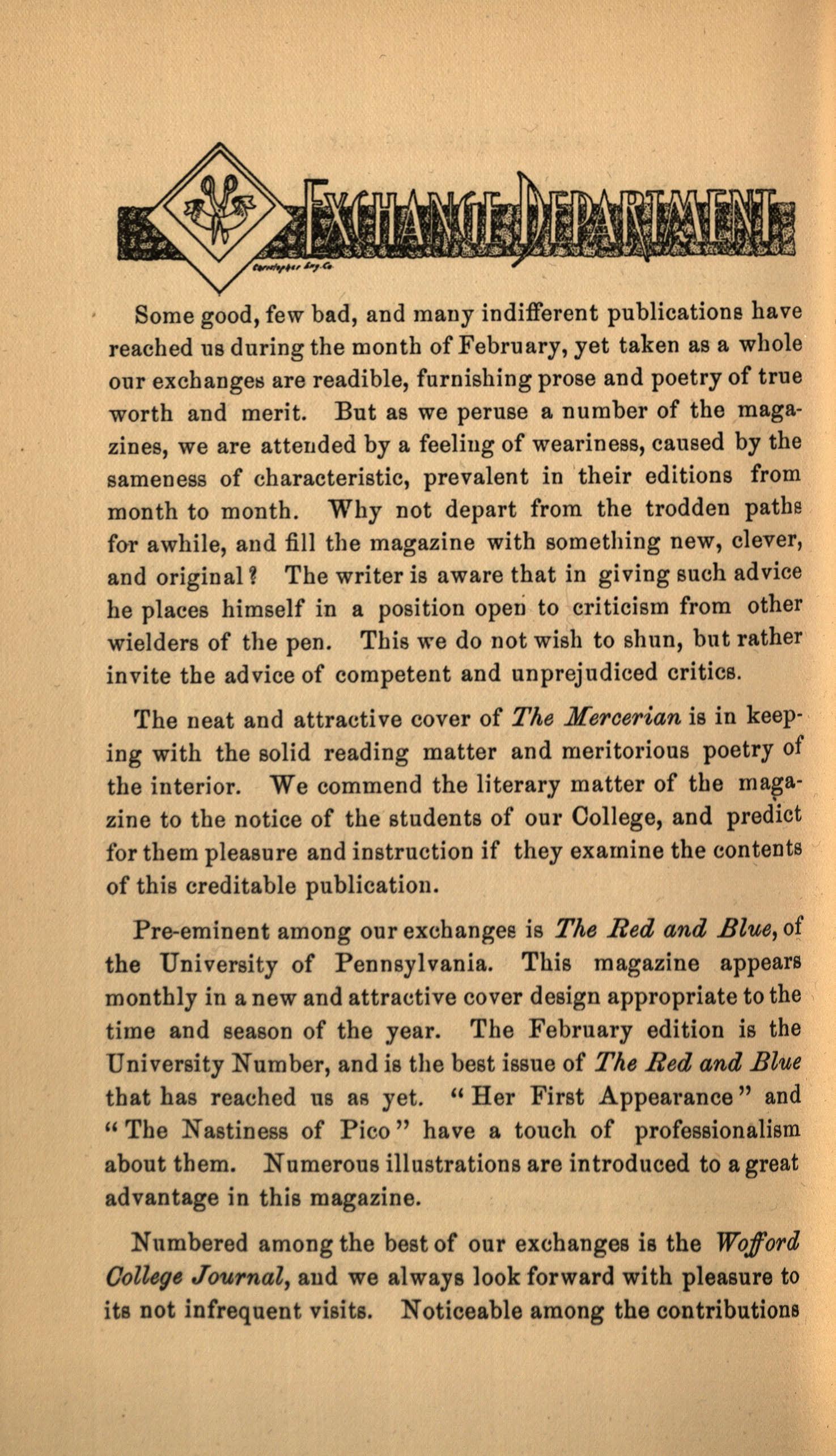
Some good, few bad, and many indifferent publicatione have reached us during the month of February, yet taken as a whole our exchange1:1are readible, furnishing prose and poetry of true worth and merit. But as we peruse a number of the magazines, we are attended by a feeling of weariness, caused by the sameness of characteristic, prevalent in ' their editions from month to month. Why not depart from the trodden paths fo-r awhile, and fill the magazine with something new, clever, and original¥ The writer is aware that in giving such advice he places himself in a position operi to criticism from other wielders of the pen. This we do not wish to shun, but rather invite the advice of competent and unprejudiced critics.
The neat and attractive cover of The Kercerian is in keeping with the solid reading matter and meritorious poetry of the interior. We commend the literary matter of the ma~azine to the notice of the students of our Oollege, and predict for them pleasure and instruction if they examine the contents of this creditable publication.
Pre-eminent among our exchanges is The Red and Blue, of the University of Pennsylvania. This magazine appears monthly in a new and attractive cover design appropriate to the , time and season of the year. The February edition is the University Number, and is the best issue of The Red and Blue that has reached us as yet. " Her First Appearance" and · "The Nastiness of Pico" have a touch of professionalism about them. Numerous illustrations are introduced to a great advantage in this magazine.
Numbered among the best of our exchanges is the Wofford CollegeJournal, and we always look forward with pleasure to its not infrequent visits. Noticeable among the contributions

EXCHANGE DEP A.RTMENT , 285 of the recent number are historical papers of a local nature. We are earnest advocates of such a policy among the students of our College, and think the course would be productive of much good.
The editorial department of the William and Kary College Monthly is the most attractive feature of that publication. The editorials are well written, on subjects aptly chosen. The Monthly, taken as a whole, is very fair, and far above the average.
The exchanges for the month may be found on the table in the library.
Last night I held a little band, So dainty and so neat; Methought my heart would burst with joy, So wildly did it beat.
No other hand into my soul
Could so great solace bring, Thau that I held last night, which was Four aces and a king. -Exchange.
I think a small brother's a bother, don't you? When you're dt!ep in an interesting book 'fhere's always a block-house that has to be built, Or pictures at which he must look.
If he sees when you're just on your way down the stairs, He teases to ride on your back. When he's playing at cars, a collision is sure If you dare to remain on the track.
If you dash out the door in terrible haste, And forget to kiss brother good-bye,

288- RICHMOND COLLF,JGE MESSENGER.
You hear him run crying ·and calling you back, And you turn with an impatient sigh.
Now at home I've a four -year -old brother like that; He's a tease along every such line; But I'd walk to Poughkeepsie and back every day, Ju s t t o feel his soft che ek against mine .
A. B., in Vassar Miscellany.
There is woe in the heart of the ship-wrecked tar With a biscuit once a week, And the woe of a man with a wheel broken down, Twenty miles away from town, Is much too great to speak; But the woe of neither can compare With the woe of a man whom a maiden fair Has just thrown down, when his surmise Was that he was cutting a lot of ice, And he finds love's labor entirely lost, For the ice he has cut has created a frost.
-The Georgian.
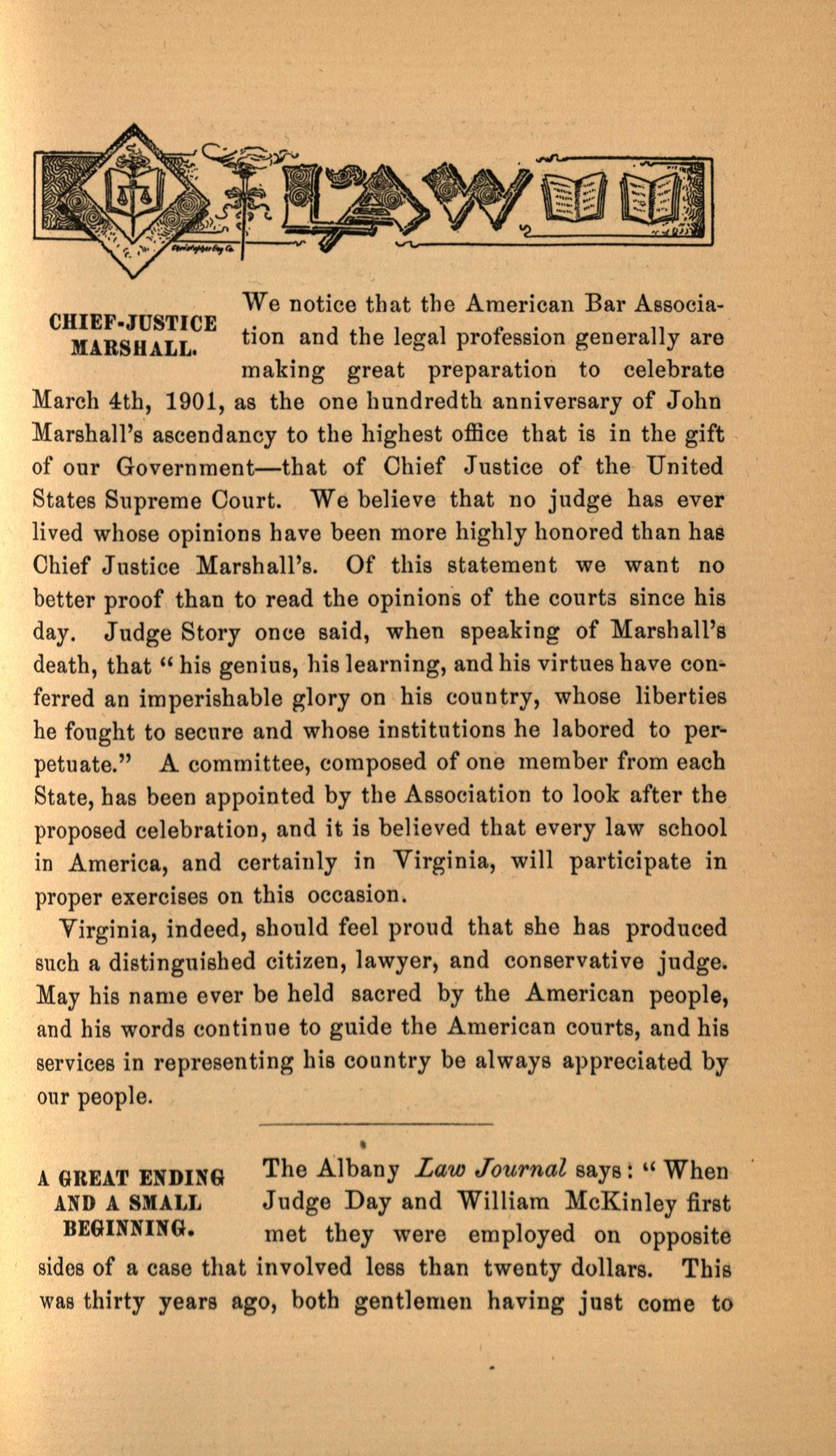
We notice that the American Bar AssociaCHIEF-JUSTICE
MARSHALL, tion and the legal profession generally are making great preparation to celebrate March 4th, 1901, as the one hundredth anniversary of John Marshall's · ascendancy to the Mghest office that is in the gift of our Government-that of Ohief Justice of the United States Supreme Court. We believe that no judge has ever lived whose opinions have been more highly honored than has Chief Justice Marshall's. Of this statement we want no better proof than to read the opinions of the courts since his day. Judge Story once said, when speaking of Marshall's death, that "his genius, his learning, and his virtues have conferred an imperishable glory on his country, whose liberties he fought to secure and whose institutions he labored to perpetuate." A committee, composed of one member from each State, bas been appointed by the Association to look after the proposed celebration, and it is believed that every law school in America, and certainly in Virginia, will participate in proper exercises on this occasion. Virginia, indeed, should feel proud that she has produced such a distinguished citizen, lawyer, and conservative judge. May his name ever be held sacred by the American people, and his words continue to guide the American courts, and his services in representing his country be always appreciated by our people.
A GREATENDING The Albany Law Journal says:" When AND A SMALL Judge Day and William McKinley first BEGINNING. met they were employed on opposite sides of a case that involved less than twenty dollars. This was thirty years ago, both gentlemen having just come to
288 RICHMOND COLLEGE MESSENGER.
Ca~ton/Ohio, to practice law. The case was tried in a blacksmith shop, with a justice of the peace presiding."
' This world's history is full of triumphs of those who have had to :fight from beginning to end for recognition. Burns, the great poet, was a day-laborer. Ben Jon son was a brick-layer. David Livingstone, the traveling missionary, was a weaver. Andrew Johnson, President of the United States, was a tailor. These extraordinary results have Jed many a man to doubt whether the gift of geniu~ be so exceptional an endowment as it is usually represented to be, but rather proves that all of our great meri, whether in politics, in war, in literature, or in science, have been men of one idea-not because they were incapable ~f harboring more than one thought, but because, having selected some one object as worthy of attention, they gave themselves up to it solely. Yet, while admitting the wonderful achieveinen t of labor, it is obvious that, without the original endowment of head and brain, no amount of labor, however well applied, could have ever produced a Shakespeare or a Newton.
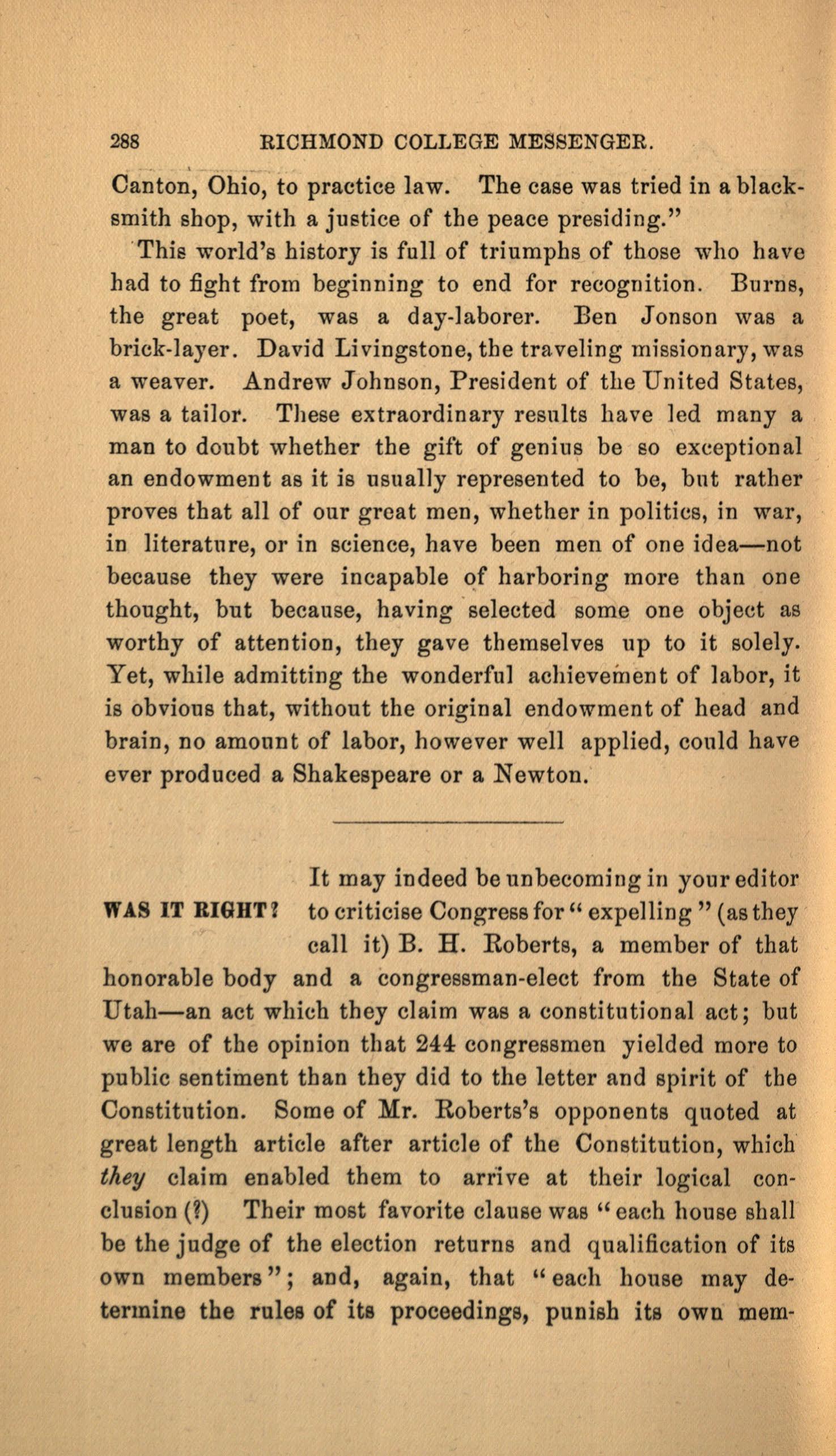
It may indeed be un becomfog in your editor WAS IT RIGHTi to criticise Congress for" expelling" (as they call it) B. H. Roberts, a member of that honorable body and a congressman-elect from the State of Utah-an act which they claim was a constitutfonal act; but we are of the opinion that 24:4 congressmen yielded more to public sentiment than they did to the letter and spirit of the Constitution. Some of Mr. Roberta's opponents quoted at great length article after article of the Constitution, which they claim enabled them to arrive at their logical conclusion (i) Their most favorite clause was "each house shall be the judge of the election returns and qualification of its own members"; and, again, that "each house may de- , termine the rules of its proceedings, punish its own mem-
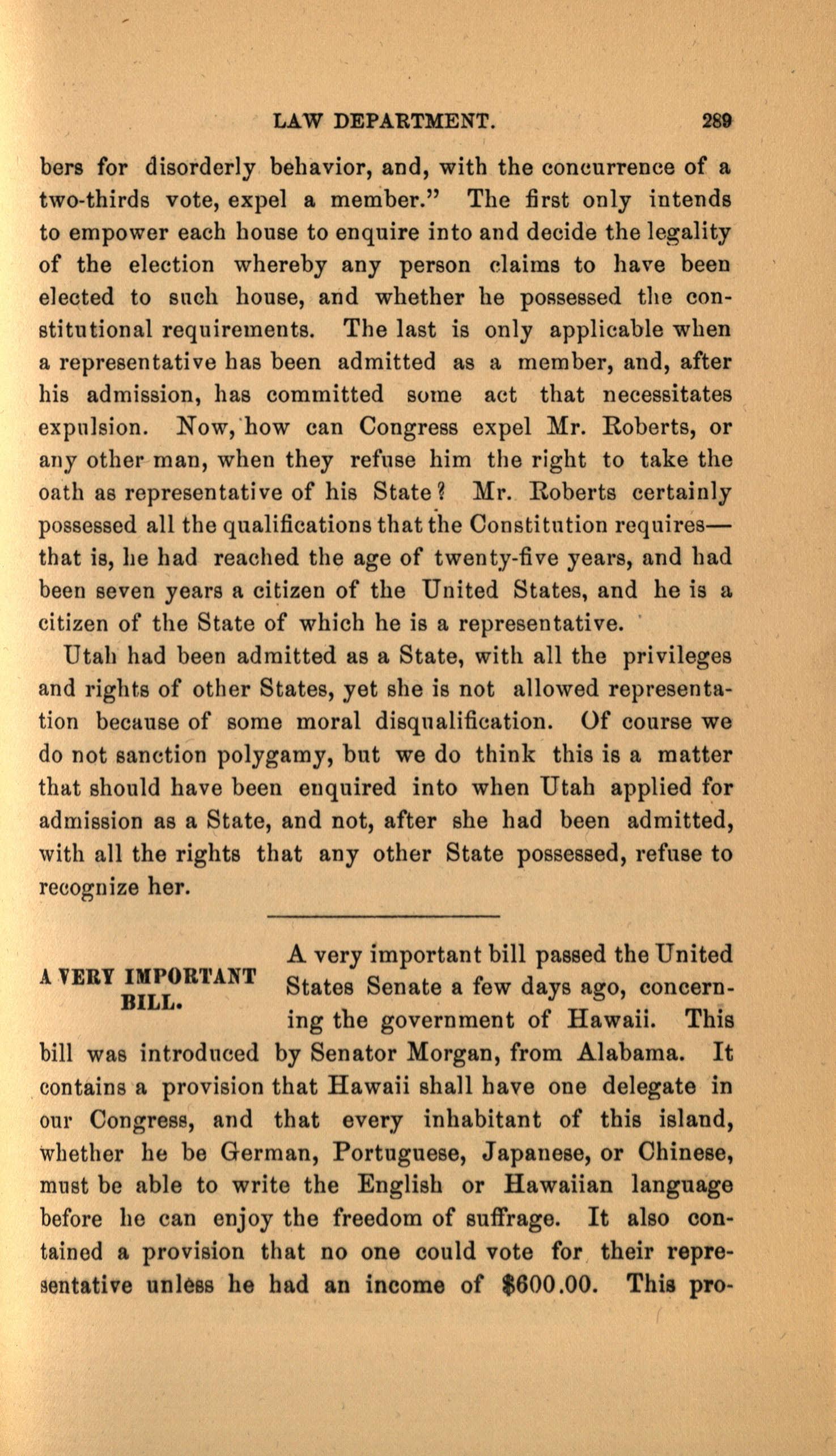
bers for disorderly behavior, and, with the concurrence of a two-thirds vote, expel a member." The £rst only intends to empower each house to enquire into and decide the legality of the election whereby any person claims to have been elected to such house, and whether he possessed the constitutional requirements. The last is only applicable when a representative bas been admitted as a member, and, after his admission, has committed some act that necessitates expnlsion. Now, "how can Congress expel Mr. Roberts, or any other man, when they refuse him the right to take the oath as representative of his State 1 Mr. Roberts certainly possessed all the qualifications that the Constitution requiresthat is, he had reached the age of twenty-five years, and bad been seven years a ci~izen of the United States, and he is a citizen of the State of which he is a representative. ·
Utah had been admitted as a State, with all the privileges and rights of other States, yet she is not allowed representation because of some moral disqualification. Of course we do not sanction polygamy, but we do think this is a matter that should have been enquired into when Utah applied for admission as a State, and not, after she had been admitted, with all the rights that any other State possessed, refuse to recognize her.
A very important bill passed the United A.VERY IMPOR1'ANT States Senate a few days ago, concern- BILL.
ing the government of Hawaii. This bill was introduced by Senator Morgan, from Alabama. It contains a provision that Hawaii shall have one delegate in our Congress, and that every inhabitant of this island, whether be be German, Portuguese, Japanese, or Chinese, must be able to write the English or Hawaiian language before ho can enjoy the freedom of suffrage. It also contained a provision that no one could vote for their representative unless he had an income of 1600 .00. This pro-
290 RICHMOND COLLEGE MESSENGER.
vision met with great objection, and was finally struck out. The entire bill was opposed, on the ground that it would attach to our country a population undesirable as citizens, but the bill passed almost unanimously.
This bill seems to us to contain the true principle of government, and it furnishes a good suggestion for the regulation of our own voters.
"My
son, set this as a text before

THE
NATURE OF A th' d d '1 med1'tate thou LEGAL
ARGUMENT.
me eyes, an ai y thereon:
(1) Lo, the chief business of the advocate in arguing before appellate tribunals is to distinguish between things similar, but in fact different.
(2) And thence cometh it to pass that, than the study of the law, there is naught better to improve and invigorate the judgment of man;
(3) For this is the very quintessence of the science and art of legal logic and legal reasoning,
(4) And thereby is cultivated the faculty of sound legal common sense;
(5) Yea, also, thereby is developed the legal mind.
(6) For it is indeed the chief exercise of the lawyer's mind to compare and to discriminate;
(7) Because there is an almost infinite number of principles and cases,
(8) And these doth run into and overlap the one the other, even each bis fellow;
(9) Wherefore their nice shades of difference can only be observed by a power of discrimination,
(10) Improved and disciplined by living habits of attention and practice.
(11) Seest thou not that the argument at the bar and the enunciation from the bench are the mere exergise

291 of the judgment on a comparison of principles and cases 1 (12) So order, then, thy disputation as to state the very point or proposition,
(13) And, by a process of analogical reasoning, to prove its truth by the similitude of former adjudications.
(14) And ' in this thou shalt succeed in proportion to thy capacity to illustrate and prove by analogies thou bringest in;
(15) Or, in other wordsi by thy ability in discovering and pointing out these analogies and agreements between principles and cases apparently dissimilar ;
(16) Or in finding differences where there is an apparent similarity ;
(17) The same being a pure process of the judgment, aided by the power of discrimipation,
(18) For the extended exercise of which there is ample room.- W. B . .Morris, of JJanville, Ill., in Law Student Helper.
P HILOLOGIAN , MU SIGMA RHO.
President ... .. .. JAB. D GWALTNEY. President . . .W. H. GRIFFITH. Vice-President w. M. CRUMPLER. Vice-President . ...... . L. H . WALTON. Secretary ........ W.W. GORDON. Secretary . J. BILLICOFF.
Trea s ur e r M. 0. SOWERS. Treasure r R. F. STAPLES.

Dlrector PROF. J. R. HUNTER. President •. S M SOWELL . President J. P SCRUGG S. Vice-President J. W. SHEPHERD. Librarla.n • s . T. MATTHEWS. SecFetary A o. HARL OWE. Treasurer J.P. McCABE .
President . PROF. E. M. LONG. Vice-President . ... A. D. JONES. Secretary . R. N. POLLARD. Treasurer B. w. TABB.
Manager .................. A. D. JONES. Captain . ....... . .......... S. M. STONE. Trainer ........ .. .. .... JULIEN HILL.
President W. S. BOATWRIGHT. V1ce-Preatdent
Secretary T. B. SPENCER. 'l'reuw'er .. ....... H. M. TAYLOll
Our Stock represents the newest and best productions of Standard and Reputable Manufacturers only.
Under no circumstances do we offer our patrons goo ds of d o u b t f u 1 quality.

Estimates on Class Pins, Class Rings, etc., etc., are largely governed by quantity required.
We only accept orders at a price consistent • with best workmanship and high quality.
CorrespondenceInvited and Promptly Answer,d.
PoraonaDe• llng with thla Firm wlll kindly mention the College MHaenger.
3". 3".. 0 0 :C...::C...J: NS., GROCERIESTobacco and Cigars, , CONFECTIONERIES a Specialty.~
STATIONERY, LAMP FIXTURES, OILS, and STUDENTS' SUPPLIES, 1500 W. BROADSTREET, OPPOSITETHE COLLEGE.
JAMES E. OOODE PRINT/NO CO., (JOHN T. WEST, Proprietor,)
11'\ublfsbersTeachers' Public School l{egistersof Va. and Viqinia II:-' School Journal; Warrock-Richardson Almanac. COLLEGEAND SCHOOLPRINTING A SPECIALTY. ESTIMATES CHEERFULLY GIVEN, No '1 Korth Seventh Street, RICHMOND, TA.

We Make the Best Style and Latest Photos at the Lowest Prices. Fine Finished Photos as Low as $1.00 per Dozen. call and See our Work Before C WEBSTER & CO Golna- .lb.lsewhere. • • SP E CIAL PRICES TO STUDENTS.
It may be a convenience to visitors to know the RroHMONDExcIIANGE
_ / FOR WOMAN'SWoRK (Third st., cor.
TFranklin) is prepared to take orders for Home-Made Cakes, Breads, and everything made by good housekeepers. Elaborate or simple Suppers, Dinners, and Luncheons can be furnished on short notice. The most beautiful Fancy Work always for sale. Sewing of every description done. Gentlemen's Clothing neatly repaired.

Every Home, School, and Office Should Own Webster's International Dictionary of &~GLISH, Biography, Geogra.phy, Fiction, etc. STANDARD AUTHORITY of the U. S. Supreme Court, all the State Supreme Courts,the U.S. Government Printing Office and of nearly all the Schoolbooks, Warmly commended by College Presidents, State Superintendenta of Schools, aod other Educators almost without number.
· Charles W. Ellot, LL. D., President ol Harvard University, says:" The Jntcrnational is a wonderfully compact storehouse of accurate information."
A NEW BOOK-the largest of the abridgments of the International. It bas a sizable vocabulary, complete definitionsand ad«Juate etymologies. Has over JlOO pages and is richly dlustrated. Size 7x10x2 5-8inches. Its appendix is a storehouse of valuable information.
Nlcholu Murray Buth•r, Ph.D., Columbia Unlveralt:,, New York, •ay.s :The Collegiate Dictionary is first class in quality and admirably adapted for everyday use.
Sptcimm pagu, de., of bolli books smt on application.
G, & C. MERRIAM CO., Publiahers, Springfield, Maas.
Intercollegiate Bureau of Academic Costume
COTRELL & LEONARD,472-478 Broadway, Albany, N. Y . . ........ MAKERS OF THE ·······........ .
To the American Universities and Colleges. Illuatrated Bulletin, Samploe, aud Price• upon application.

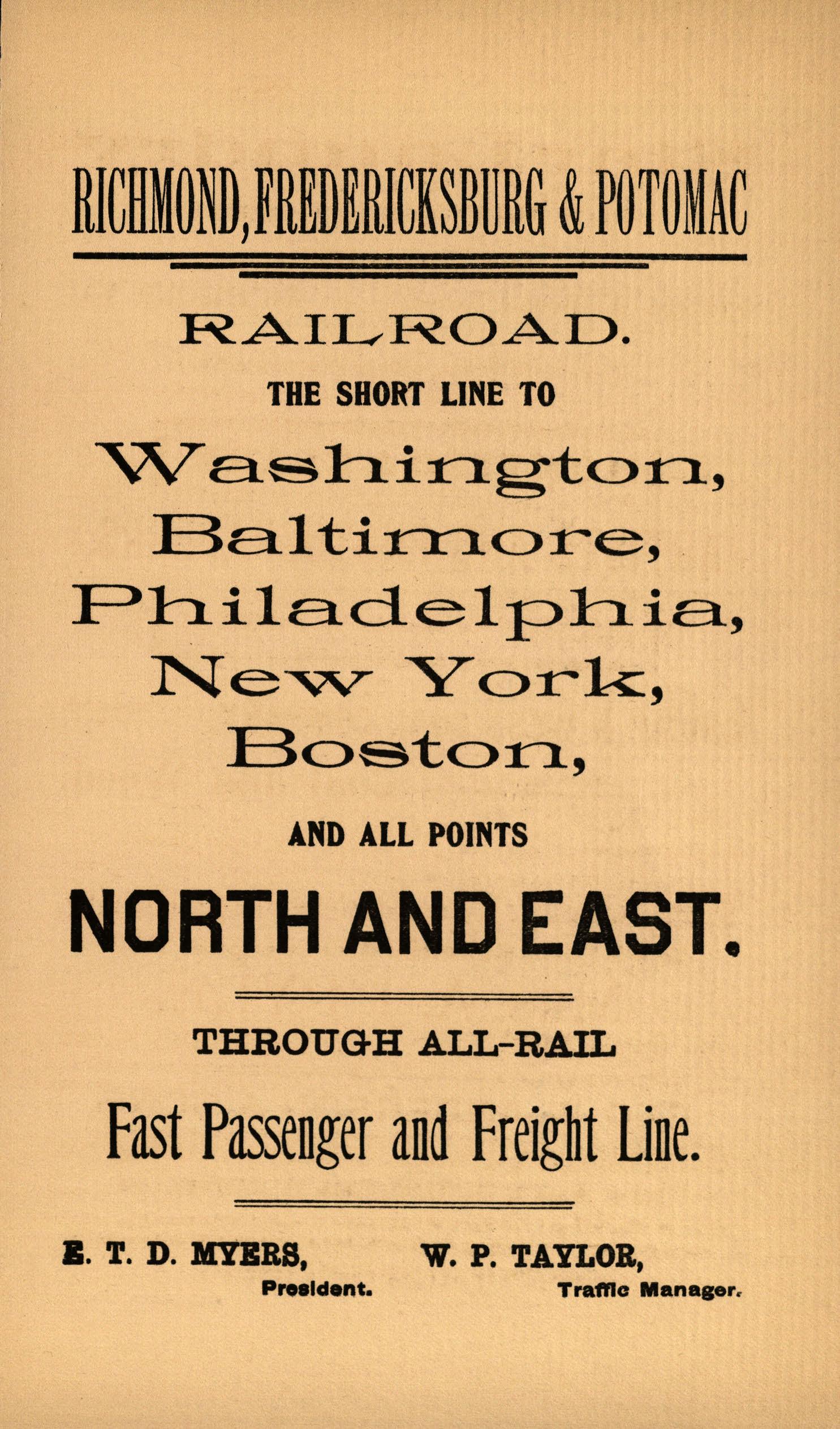
f{ISTO~ICJU.1•=== = =--
The College was founded in 1832. It was mov ed from t he country to its present beautiful park in Richm ond city in 1834. The value of grounds and buildings is $400,000. The valae of end owm ent is $260,000. The endowed Library contain s 13,000 volum e s, and is kept suppli ed w ith the newe st standard books. ·
Ir,1ST~UCTION.-= ===:::;--
Full Corps of Professors in Twelve Departments. Cour ses leading to degrees of B A , B. S., M. A., and Bachelor of Law. Thorough instruction. High standards.
BXPBr,tSBS=====--
Tuition free to all students for the ministry. Endow ed Scholarships pay tuition for twentr-eight worthy students. Donation Funds aid mimsterial students from other States. The total living expenses of a student who pays all fees are less than $225 for session of nine months. Table board costs $7.50 to $10 a month.
lt.R.w~-""=======---
A flourishing School of Law offers legal training at s mall cost, . under the most favorable surroundings. Junior and Senior Glasses. Fees for entire session, $61 to $76.
I.tAST SBSSIOr,1=====--
During 1898-'99 there were two hundred and sixtytwo students. The good health of students was unbroken by any case of serious sickness. Forty-one Degrees, one hundred and sixty-eight Diplomas, and three hundred and ninety-two Distinctions awarded June 15, 1899, indicate that the session's work was faithfully done.
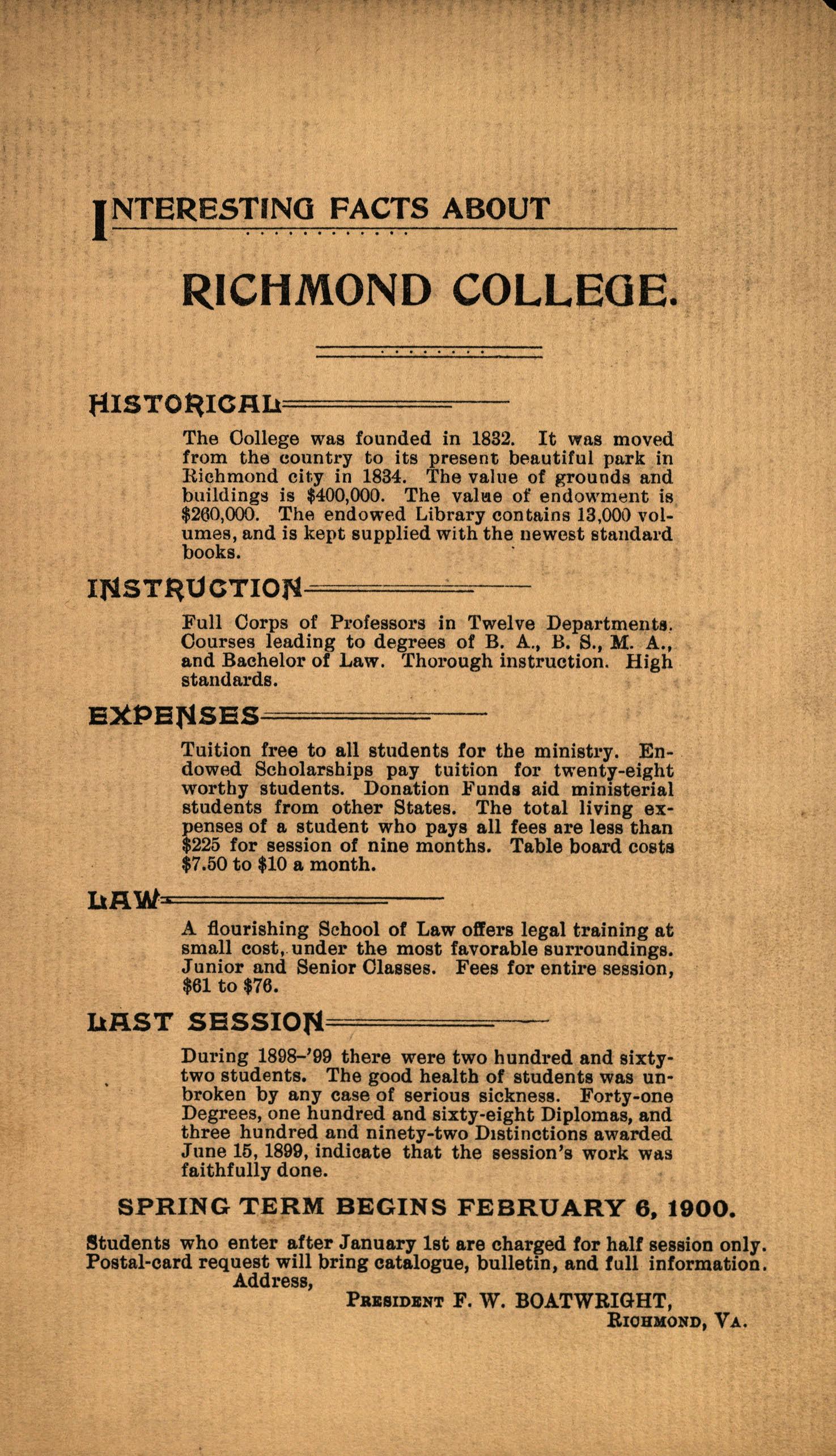
TERM
FEBRUARY 6, 1900.
~tudents who enter after January 1st are charged for half session only. Postal-card request will bring catalogue, bulletin, and full information. Address,
PBHIDBNT F. w. BOATWRIGHT, RIOHHOND, VA,